










Find out all about two of the Costa Blanca’s most iconic destination towns in our special 12-page supplement inside

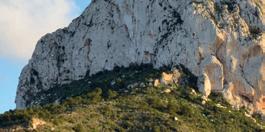
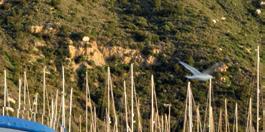

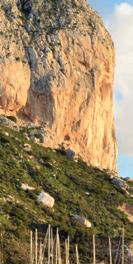
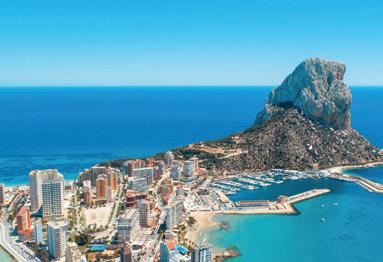
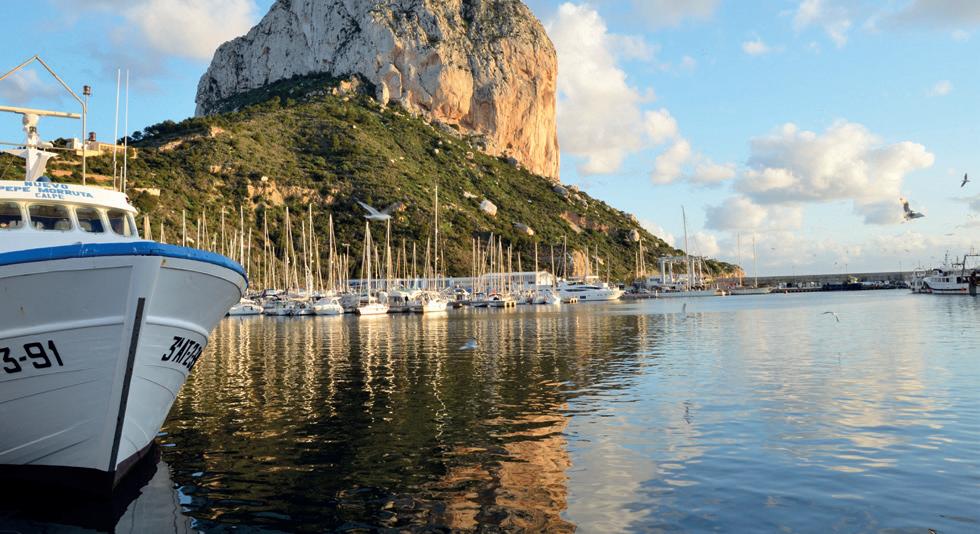
hospitalised after police and bouncers attacked him on a night out in Portugal. The solicitor, based between Marbella and Alicante, needed treatment after the beating in Lagos. The boss of the well-established legal firm was attacked after being violently ejected from a bar and went to file a complaint to local police.
The British Law Society member,
By Jon Clarke
who grew up in Spain, told the Olive Press he was ‘completely shocked’ to be beaten up for ‘absolutely no reason’.
The father-of-two had been having a ‘quiet g&t’ with an Irishman, who was also on holiday.
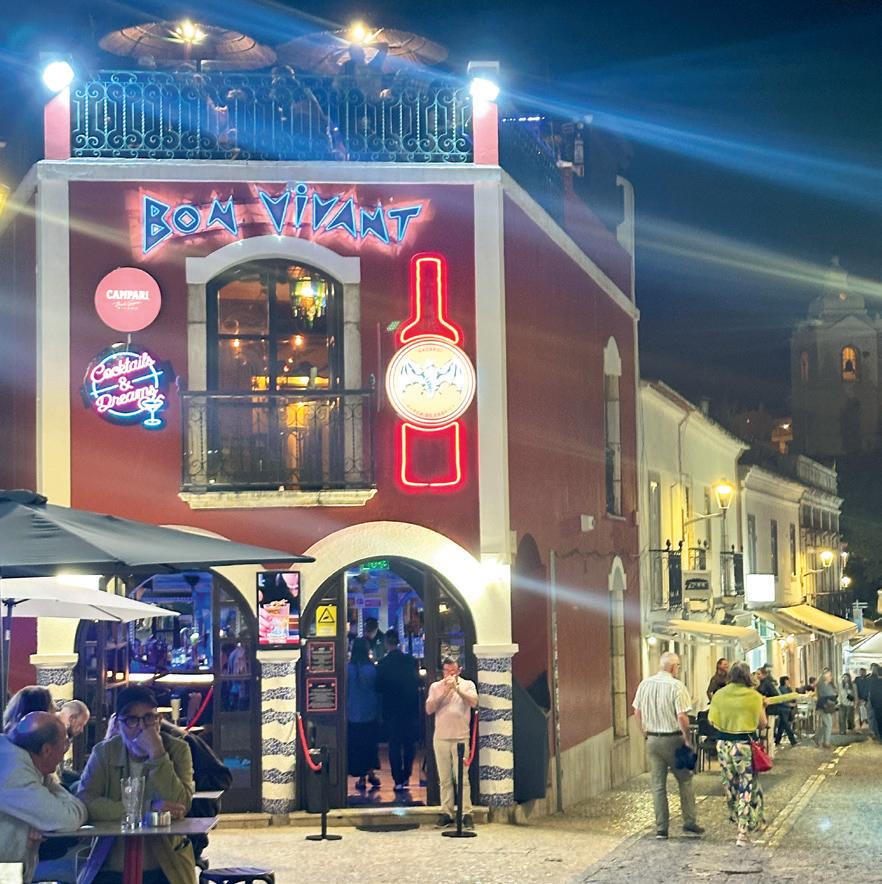
BATTERING:
The lawyer was firstly attacked at Bon Vivant in central Lagos
“One minute I was at the bar chatting with this guy, Matt, and the next I was picked up and ejected from the place,” he revealed, insisting on anonymity for legal reasons.
“It was very aggressive and without warning and I ended up on the floor.”
But it was then that things took an ever darker turn.
Getting up he could see a group of four policemen standing outside the bar, Bon Vivant, and said he wanted to make an ‘official statement’.
“I said: ‘I’m a
lawyer and it was not acceptable behaviour from the bar staff.
“But they just said ‘go away,

FUN NIGHT: But the banter ended abruptly soon after pic was taken

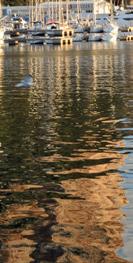













go home’ and then suddenly this one cop pushed me over violently, before taking me down a side street.
“I was then knocked on the head and fell over. It was really brutal and shocking and I thought I was not going to get out of it.”
Somehow though he managed to get away and he carefully circled back to the square a short while later to get photos of the police - who are part of the PFP security force - for evidence. He then headed back to his hotel he was staying at with his two adult daughters.
“I decided to take a longer route home, via the central square, Jardin de la Constitucion, and it was there when I was suddenly attacked again.”
He continued: “These two people literally bounded up and jumped on me from behind.
“They put me in a headlock and started strangling me. They wanted me to pass out.”
When he came to, he was ‘very dazed and disorientated’ and assumed he’d
been mugged.
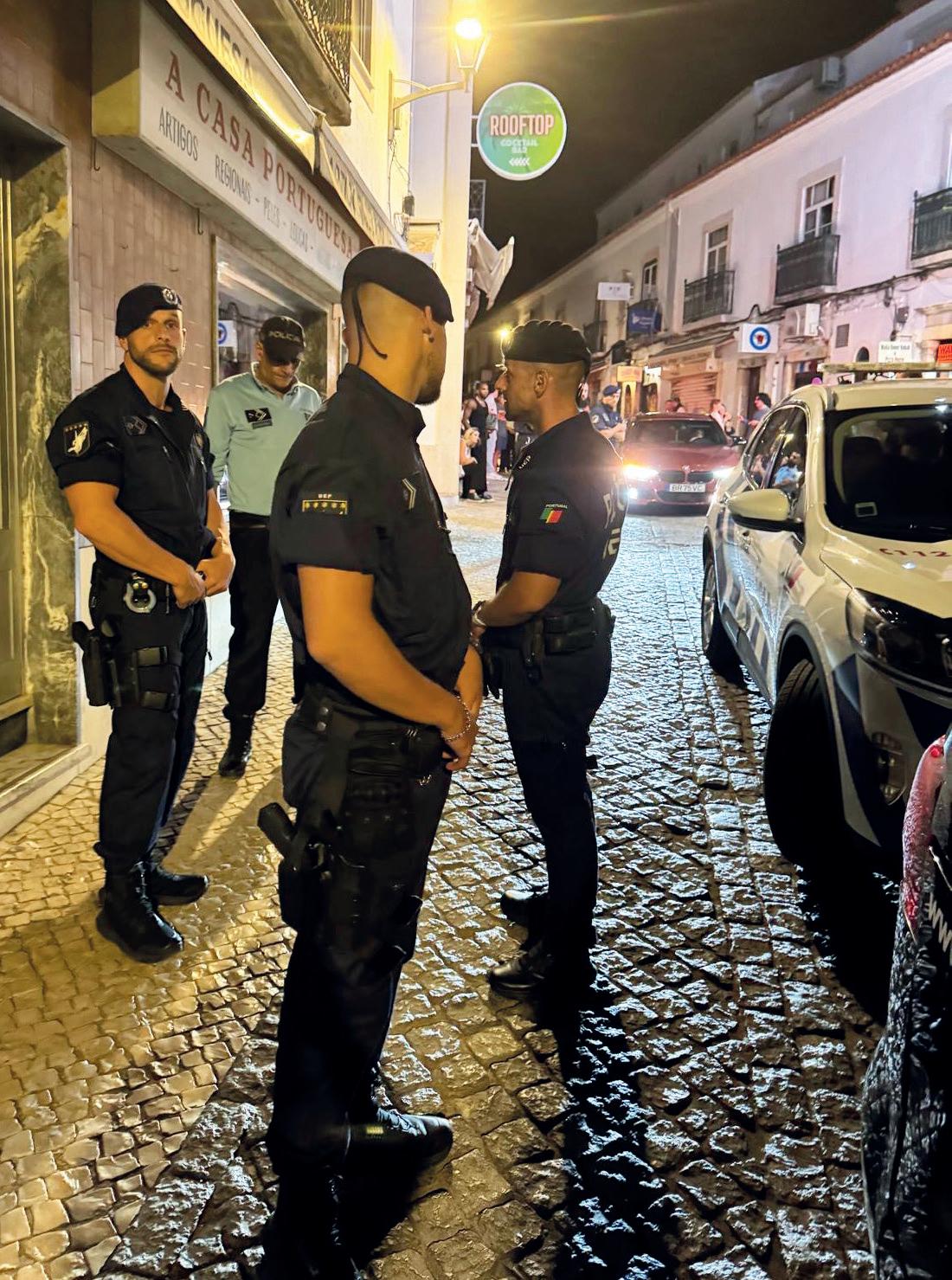
ACCUSED: Squadron of PFP officers outside the club
“But I still had my wallet, watch and phone with me so it was clearly for other reasons.”
He continued: “I’m sure it was the police or bouncers who did it and I have no doubt they were in collusion.”
Somehow with the help of a ‘Good Samaritan’ he got to a local health centre, where he was treated for cuts, bruises and a possible broken arm.
So worried was he of further ramifications he sent a series of over two dozen messages with photos of his bruised face to the Olive Press ‘for security’.
He also sent a series of dramatic voice notes, in which he insisted he was ‘really frightened’, insisting it needed to be ‘reported’ by the media.
The lawyer, who worked for leading UK firm Irwin Mitchell for years, has now filed an official complaint on the Algarve.
After going to an official judicial doctor, he filed the denuncia at the Policia Judiciary (PJ) headquarters in nearby Portimao.
It is now being handled by the Lagos
Public Prosecutors office, we have established.
Alarmingly the Olive Press has found at least three other violent incidents at Bon Vivant over recent months. At least two punters were attacked with ‘pepper spray’ by bouncers, while a woman, Ines Paredes, claims she was recently ‘kicked out by the neck’.
“He almost hit me,” she added in the post on Google. There are even more serious allegations of a drunk woman being ‘undressed’ on the dancefloor by ‘a member of staff ’.
And when the incident was reported to the manager it was dismissed as ‘a joke’.
All the incidents, including this, were rebuffed by the club’s ‘bar manager’ Marco Monteiro on Google.
However, a local expat restaurant owner, told the Olive Press he had heard of ‘a few unprovoked incidents’ similar to this.
“But it is not anyone I know so it

would be best to go to the police and see what they say.”
It is unsure what will happen next but the lawyer is clear about one thing.
“The job of the police is to protect the public,” he said, now back home in Marbella.
“It is really important for the courts to properly deal with incidents like this and particularly Bon Vivant, having read all the other negative reports.
“I fear if they don’t, there could be much worse cases over the next few months.”
When the Olive Press visited the club, a barman insisted he couldn’t ‘recall any incidents like that’. Manager Marco didn’t get back by phone or WhatsApp messages.
A police source confirmed to the Olive Press the ‘case is being dealt with by the Lagos prosecutors’.

A RECORD 9,000 people will take part in Saturday’s Benidorm Half-Marathon and 10k run - 2,500 more than last year.
THE mayors of Benidorm and Torrevieja have appealed for more government cash to pay for extra services like health during summer tourist seasons.
SAN Javier council will take legal action against Spain’s government for not refunding beach clear-up costs sustained during October’s Storm Alice.
A MURCIA man has been arrested after five Orihuela high school students were poisoned by smoking mairjuana vapes bought from his CBD shop.
A POLICE file into the death of an expat in Andalucia has revealed strong evidence of a violent robbery – yet the case has been provisionally closed by a judge.
Brett Dryden, 35, (pictured) was found dead inside his Mojacar home on July 22 last year with his phone, wallet and an estimated €8,000 missing –and blood stains all over the house.
Yet his mother Sandra told the Olive Press this week, she was shocked the investigation was curtailed in September –despite numerous leads being unexplored.
“The whole thing is an absolute s*** show,” she said, adding that the Guardia Civil report was ‘a joke’.
She revealed her family are now hiring a private investigator to find out what really happened.
What is known is that the father-of-one had left his cannabis club, The Dawg House, at 1.35 pm on the day of his death, telling an employee he would ‘be right back’. He never returned. His phone
Mother furious with police as they close case on son’s killing despite numerous signs of foul play and a link to Albanian drug dealers
By Walter Finch
records show he received a call around 2 pm, telling a friend that ‘people he was waiting for’ had arrived at his house. Around the same time, nearby CCTV footage showed a man in a cap and mask loitering outside Brett’s door, acting as an apparent lookout for at least 15 minutes.
One minute later, two masked figures were seen running from the house, one carrying a large bag and the other a smaller one resembling Brett’s cross-body pouch.
The police report, seen by the Olive Press, also reveals Brett
THREE men have been arrested after an expat restaurant owner was dragged to his death when they stole his iPhone in Torrevieja.
Police inquiries led them to an Alicante City district with the trio - aged 21 and 22 - belonging to an established criminal gang detained.
Swedish expat Christian Pikulak, 30, died after being pulled several metres under a car when his phone was snatched.
Mr Pikulak - the owner of the ‘Smashed Burger’ restaurant - died in Elche Gener-
had arranged to meet an Albanian cannabis supplier known as ‘Irdi’ at his home.
Witnesses described Irdi as always being accompanied by another man, ‘Hakim’ or ‘Hakir’ both of whom were familiar in the local drug scene.
Despite detailed descriptions, there is no indication in the police file handed to Brett’s family that either man was questioned or even located by investigators.
What is clear is that Brett’s friend Ashley Povey found his body a couple of hours later in the living room, with his dog sitting nearby.
His belongings were gone, and the front door was open. Ini-
al Hospital four days later. Authorities said the detainees - all Spanish - had gone into hiding to evade justice.
Two of them were arrested on November 10 with the third apprehended two days later.
tial reports from officers claimed there had been ‘no struggle’ and that Brett had died from a pulmonary embolism.
This was despite a forensic report revealing multiple head injuries and internal bleeding, which led to the cause of death being re-
vised to homicide.
One of the most shocking aspects of the case involves Brett’s stolen iPhone.
Despite the phone being missing from his home, a one-second internet call was made to his mother’s number hours after his death.
Investigators traced the phone’s signal to Vera, a nearby town, and later located the device near a campground.
Strangely, another phone, registered to a woman with no criminal record, was traced to both Brett’s home and the campground.
Although investigators found that multiple people, including one with a criminal history, lived at the property, no interviews were conducted with any of them.
Despite these red flags, the Guardia Civil closed the case in September, citing a lack of identifiable suspects.





A judge issued a provisional archive order, meaning the case could only be reopened if new evidence emerges. Brett’s family insists the evidence points to a violent robbery gone wrong, but they feel the investigation was never taken seriously.
“I just want to know what happened to my boy,” Sandra continued, expressing her disbelief that authorities had no interest in solving the case.
“I feel like they never intended to solve Brett’s murder.” The family’s attempts to appeal the decision have been met with silence. Their lawyer reported that the police phone number connected to the case is no longer working, and they have been waiting for a response for over five weeks.



OVER 30,000 people - mainly British expats and tourists - lined Benidorm's streets for the annual ‘Fancy Dress Party’.










The event organised by hospitality associations in the Rincon de Loix ‘English Zone’ of the city and backed by the local council, has been going strong for over 30 years.
The event attracts thousands of visitors each year.
Benidorm mayor, Toni Perez, said the festival started in 1994 and was created by local businessman Manuel Nieto.
“Since then it has only grown to become, possibly, the largest costume party in Europe,” he commented.
“It began in a very informal way, as a party among friends, and currently brings together more than 30,000 people to have a good time and to be happy,” Perez added.
ANGELINA Torres, the oldest person in Spain, has died in Barcelona aged 112. The supercentenarian became Spain’s oldest lady 14 months ago following the deaths of fellow Catalan Maria Branyas, who was the world’s oldest living person until her death aged 117 last August, and Piede Loriente from Aragaon, who died aged 113 last September.






By Ben Pawlowski




Lots of caffeine - sometimes sweetened with a dash of Bailey’s.













Born on March 18, 1913 in the village of Bellvis, Lleida, Angelina lived in Barcelona from an early age. Her family home was near the
Sagrada Familia - Antoni Gaudi’s gothic basilica that still remains unfinished, although a completion date has finally been penned in for Angelina had six siblings and began working as an apprentice
Coffee and a dash of Bailey’s kept her alive
dressmaker at a local shop aged 15, where she earned six pesetas for every 12 ties she made.
After the Spanish Civil War, she married her boyfriend, Josep Marti. They had one daughter, Merce, who is now 81 years old.






Catalan president Salvador Illa was among those to pay tribute to Angelina on social media.
“I had the privilege of meeting Angelina Torres last year. A wise woman, full of faith and kindness, very hardworking and with great strength,” he posted on X




Angelina was a grandmother to two and great-grandmother to three children.
“I would like to be remembered as someone who has done everything she could for others, young and old, always with my arms wide open,” Angelina said in an interview last September. Her secret to longevity? next year.
“I will always remember a phrase she said to me that marked me deeply: we must help each other, with open hands, never clenched. I promised her, so I will do just that.”
The title of Spain’s oldest living person now falls on Carme Noguera Falguera, a 111-yearold woman from Olot, Girona.
THE world has a new Goddess of Pop - and she is Spanish. Rosalia has redefined music with her genre-bending fourth album, Lux. Blending flamenco, rumba, opera, and 14 languages, it’s been hailed as her best work yet, with critics calling it ‘exquisite’and ‘spectacular.’
Featuring collaborations with Björk, Estrella Morente, and the London Symphony Orchestra, Lux smashed records on its release, earning 42.1 million streams on Spotify on day one, the most for any female Spanish-language artist.

EVENTUALLY AND, QUITE RIGHTLY, CARLOS MAZON FELL ON HIS SWORD, AS HE CANOODLED WHILE HIS CITY FLOODED KILLING 229 PEOPLE, WRITES CHARLIE MULLINS
OUR papers all over the world are full of political stories that mostly all follow the same format. Politician A does or says something stupid, dishonest, or just plain reprehensible.
Politician B and his entire party pile in screaming for A to fall on his - or her - sword, and they never do. Certainly not in Spain!
But every now and then, just like surfing, out of nowhere a monster wave comes along, sweeping all before it.








This is the case of Valencian President Carlos Mazon, who resigned last week over his failures during the flooding tragedy of October last year. It is not as if Mazon didn’t put up a fight, clinging on to power for an entire year before he eventually fell on his sword, engulfed in an ever growing ball of rage.




Something of a modern-day Nero, the emperor who ‘fiddled while Rome burned’, Carlos was caught


flirting while Valencia flooded.
A little background: it was on October 29, 2024, that El Presidente was the man in charge of declaring an official ‘catastrophe’. This would have meant putting out early urgent messages and mobilising hundreds of emergency workers to save a community from an oncoming violent DANA flood.


Its lead single, Berghain, topped charts in Spain and beyond. Rosalia mania has swept Spain, with even Prime Minister Pedro Sanchez praising her.
The Catalan’s religious imagery has sparked adoration among fans and clergy alike, some calling her a modern saint. Despite some criticism, Lux has solidified Rosalia as a cultural icon. As Die Zeit put it: “Pop has a new goddess.”



politics. But he damn near managed to hang on to his job, despite more than a dozen protest marches of up to 50,000 Valencians baying for his blood.
The polls were just as damning with 75% of voters wanting him gone.
PRESIDENT Xi Jinping welcomed King Felipe during his four-day state visit to China - his first since ascending to the Spanish throne in 2014.
The monarch and Queen Leitizia’s trip started in Chengdu, the capital of south-western Sichuan province.

During their meeting in Beijing, Xi and Felipe witnessed the signing of several cooperation agreements aimed at strengthening bilateral ties.
China is Spain’s largest trading partner outside the EU, with bilateral trade reaching $48.6 billion in recent years.
King Felipe said: “A relationship of trust has been forged.”

Instead, married Carlos, a fatherof-two, went on a long boozy lunch with blonde TV journalist Mirabel Vilaplana (both pictured), and when lunch was done they continued on their no-doubt Rioja-fuelled conversations, before heading for an hour ‘to a nearby car park’.
So when he finally stepped down last month, my first instinct was a story of virtue, a politician who did the right thing and surrendered his high office as a sign of remorse and responsibility for something that happened on











Meanwhile the giant flood claimed 229 lives, the worst in recent history.
blonde in history. You’d career

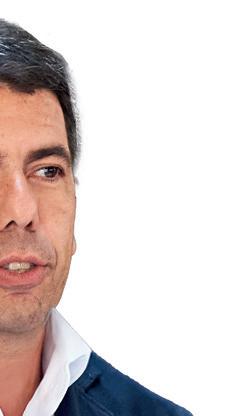



You’d think this oversight would be the end of Carlos’ career in

Sadly that’s not what happened here.
What I do think though is that if Carlos was seen having working lunch with a middle-aged male civil servant the story might have died a natural death.
So, the moral of the story, if indeed this immoral little tale has one is, don’t go on a bender with a pretty blond who isn’t your wife during a major natural disaster… you never know you might just weather the storm.





ALICANTE switches on one of Spain’s most impressive Christmas light displays this Friday involving 2.6 million energy-saving LED bulbs.
Installation work started in early September with a record budget of €580,000..
The focal point will be the 18-metre high Christmas tree on Avenida de la Constitucion where the switch-on takes place at 7pm.
The lights cover 130 locations with 557 arches, 546 motifs on lampposts, 1,800 metres of garlands, and 29 ‘Happy Holidays’ signs.
Two ground displays will be next to the tree, plus three on the Esplanade, and one in Plaza de la Montañeta. Valencia’s lights will also be switched on this Friday at 7.30pm during a special ceremony at the Plaza del Ayuntamiento.
Elche’s display will get lit up on November 29.
A COSTA Blanca resort is in shock after a palm tree crashed down onto a passing car, leaving a 22-year-old man dead and sparking fury over the state of Torrevieja’s 5,500 municipal palms.
Tragic victim Martin Perez Aniorte was driving along the CV-905 near the ITV station between Carrefour and the La Hoya roundabout, when disaster struck at around 5.10pm. Without warning, a palm on the central reservation - riddled with the notorious red palm weevil - toppled straight onto his vehicle, crushing the driver’s side.
By Alex Trelinski
Torrevieja’s mayor, Eduardo Dolon, said the horror crash was a ‘tragic set of circumstances’, adding: “The car passed at the exact moment the palm fell and it landed directly on the driver’s side.”
Fire brigade sources believe a sudden gust of wind finished off the already-weakened tree. Shockingly, it had been scheduled for pruning this week, and official reports claimed it showed no visible signs of infestation.
Locals have erupted on social media, blasting the town hall for failing to tackle what many say was ‘an accident
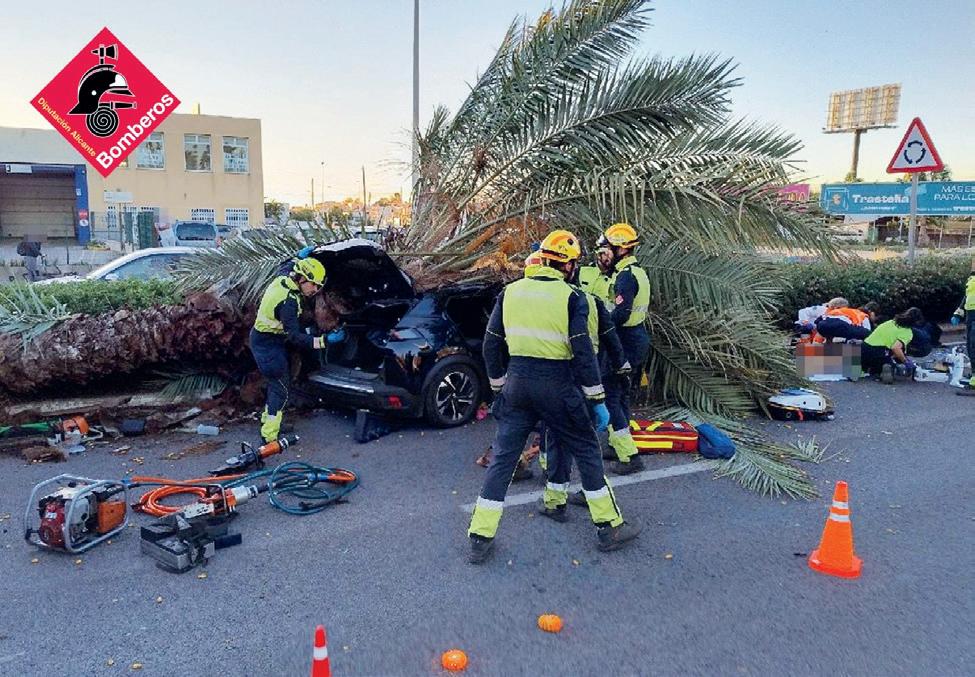
HORROR: The aftermath of the shocking incident
waiting to happen’.
Maintenance contractor Actua has now launched an urgent inspection of all 5,526 of the city’s palms. More than 3,800 are Phoenix canariensis va-
SPAIN will give up to 170 descendants of the International Brigades citizenship. It comes as the government recognises the volunteers who fought fascism and Franco during the civil war.
Around 35,000 foreigners enlisted to fight against Franco’s nationalist forces between 1936 and 1939 - up to 15,000 of whom died
in battle or in prisoner camps. “It will be an honour to call them compatriots,” said Prime Minister Pedro Sanchez. The descendants will be eligible to apply for citizenship if they hold similar views to their ancestors and ‘continue to defend democracy in Spain’.
This week marks the 50th anniversary of Franco’s death, which
brought an end to his 36-year iron fist rule and laid the foundations of a successful transition to democracy. Jim Jump, of London’s International Brigade Memorial Trust, said: “The decision underlines the determination to erase the toxic legacy of the Franco dictatorship. “For many families citizenship fulfils the spirit of the historic pledge made by the Spanish Republic to offer a home for the Brigaders.”
rieties, which are rarely hit by the destructive weevil, but hundreds of Phoenix dactylifera, the same type as the fallen tree, remain under scrutiny. The heartbreak is even deeper for Martin’s family. Both his parents had died of illness recently, and he had been living with his younger sister at his uncle’s home.
Torrevieja council has offered full support to the devastated relatives.

ALICANTE-ELCHE airport has almost surpassed last year's passenger total with two months to spare.
The Costa Blanca facility recorded a tenth successive record month for users in October.
It notched up just over 1.9 million travellers- a third of which came from the UK.
So far this year, 17.2 million people have used the airport, compared to the 2024 total of 18.3 million- an 8.3% increase.
October's total was up by 5.9% compared to last year.
The United Kingdom dominated with 631,771 passengers, followed by Germany, with 129,127, and the Netherlands with 118,996 people.
A VALENCIA woman died on a pedestrian crossing after being mowed down by a lorry.
The driver tested positive for cannabis and cocaine, despite showing no obvious signs of being impaired.
The accident happened at the junction of Calles Valle de la Ballestera and Hernandez Lazaro.
The Peruvian victim, 20, was on the crossing with a green light in her favour when the lorry hit her with its rear wheels, according to a witness.
The light for traffic was at amber and the driver was said not ‘to have seen her’.
OUTGOING Valencian president, Carlos Mazon, told a Congress committee investigation into the October 29 floods that authorities did not know that people were drowning.
Mazon (below) was grilled in Madrid on Monday over his handling of the disaster that claimed 229 lives. He announced his resignation on November 3 but remains as ‘interim president’. In a tense session, the leader of the far-left Podemos party, Ione
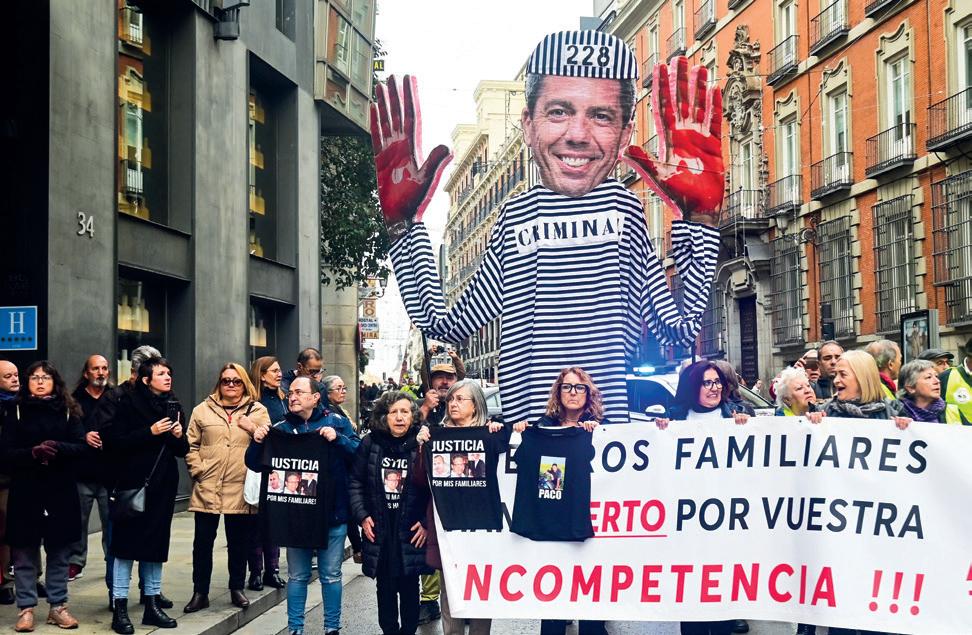
FURY: Protestors raged at Mazon’s handling of the flood crisis
By Alex Trelinski
Belarra, accused Mazon of being personally responsible for the deaths.
Gabriel Rufian of the Catalan ERC party said that Mazon should be jailed.
Families of victims protested outside the Congress building as they followed Mazon’s testimony.
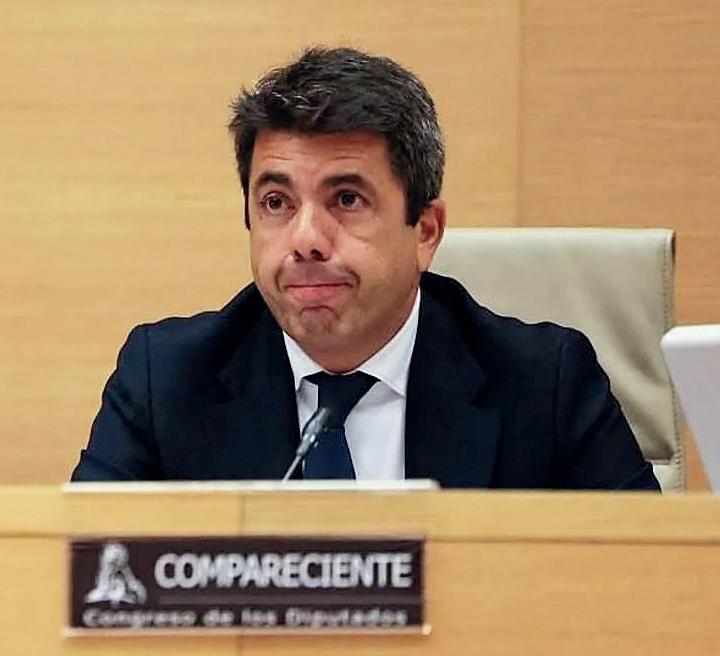
AN indoor puppy farm was illegally operated in the Quatre Carreres district of Valencia City, with 16 dogs of different breeds found by animal welfare officers and the police.
The unhealthy state of the fly-infested home made it unsuitable for both humans and animals. Authorities moved in after a neighbour complained about a foul stench wafting from the property.
Police and animal welfare personnel were greeted by pools of urine and excrement from the 80 m2 property.
Most of the puppies were kept in the kitchen including 10 poodles and two Yorkshire terriers. They were examined at the Benimamet veterinary centre.
The puppies were in a generally good state but their paws were dirty and wet due to the mess on the floor.
Some of the deputies accused him of inaction, while he countered that authorities were not conscious of the catastrophe's scale. “No one was aware of the magnitude, no one knew that people were drowning,” Mazon said. He did not provide any new details on that day’s timeline, including a lunch with journalist Maribel Vilapla-
na at a restaurant that lasted for several hours.
Neither did he elaborate on a 45-minute period when his bodyguards were absent and which records show the emergency services minister, Salome Pradas, was trying to reach him. Mazon said he could not hear his mobile phone because it was in his backpack.
He told Congress that he could not provide an exact timeline of his whereabouts, stating: “I cannot be precise about the exact timings.”
He also said ‘nothing would’ve changed’ if he had left the lunch and arrived earlier at an emergency committee meeting.
PNV Basque delegate Idoia Sagastizabal echoed the criticism of others who have said his account of events has repeatedly changed: “There are many holes in your versions.”
Mazon defended missed calls from his emergency chief, Sa-

A VIDEO surveillance camera network, recently installed by the Calp Town Council to enhance municipal security and traffic monitoring, has successfully resolved three traffic incidents within its first month of operation.
The new system has provided definitive evidence in cases that presented conflicting accounts or involved fleeing drivers, thus clarifying liability and enabling resolution. The three incidents resolved were:
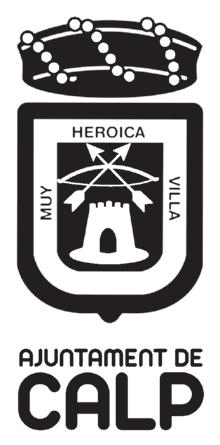
1. A hit-and-run collision that occurred between a van and a truck.
2. An accident resulting in injuries to a scooter driver, where the initial versions provided by the involved parties were contra-
lome Pradas.
He insisted that issuing the official flood warning to residentsa message that reached phones only hours into the disaster, when many people had already drowned - was not his responsibility.
“I hope you pay for everything you’ve done with prison time,” said the ERC's Gabriel Ruffin while holding up pictures of victims and demanding that Mazon publicly apologise.
He also accused him of behaving like a ‘psychopath’ at last month’s state memorial service.
On Tuesday, the Valencian socialist party filed a complaint with the Prosecutor’s Office accusing Mazon of lying to Congress.


to
as the
as Valencian President. Perez Llorca is seen as a ‘safe pair of hands’ and was in effect Mazon’s right-hand man who had a good relationship with far-right Vox party deputies.
Regional elections are not due until May 2027 but opponents have slammed a potential deal between the PP and Vox, to bring in Perez Llorca.
The socialists and the far-left regional Compromis party have called for fresh elections.
The latest opinion polls however suggest that the rightof-centre parties would win. Perez Llorca needs to secure a majority among the regional parliament’s 99 deputies to become Mazon’s successor. The investiture vote will take place next week.


Multilingual support
Bills in your language
Free calls from abroad
dictory.
3. A separate hit-and-run accident involving three vehicles where the driver who fled the scene was successfully identified.
System Implementation and Monitoring
The installation of these cameras represents the first phase of an ambitious, comprehensive plan for traffic follow-up and control within the municipality. One month ago, the Town Council installed a network of 16 video surveillance cameras across Calp’s five main roads.
All image data is immediately sent to the traffic control center, which has been established within the Local Police facilities. Control and viewing of
the cameras is carried out by the Local Police from their headquarters, and a dedicated officer has been assigned this specific role after receiving appropriate training.
The Councillors for Public Security and Information Technology have expressed their intention to continue this process by executing a second phase, which will expand the camera network to additional areas of the municipality.



The long-term objective of the overall project is to reinforce the security of Calp, monitor traffic flow, and acquire data management tools capable of analyzing levels of traffic and pedestrian movement.
To ensure the continuity of this essential project, a budget

top expat paper in
A campaigning, community newspaper, the Olive Press represents the huge expatriate community in Spain with an estimated readership, including the websites, of more than two million people a month.
THE case of Brett Dryden’s death in Mojacar is a shocking example of how an investigation can be derailed by incompetence and indifference.
Dryden, a 35-year-old British expat, was found dead with €8,000 missing, along with his phone and wallet, and clear signs of violence in his home.
Despite the evidence of foul play - bloodstains, multiple injuries, a suspicious lookout, and a stolen iPhone - Spanish authorities quietly closed the case in September.
What makes this case particularly troubling is not just the disturbing circumstances of Dryden’s death, but the failure of the authorities to follow up on critical leads.
Surveillance footage captured a masked figure outside Dryden’s home shortly before two individuals fled with his belongings.
Dryden had also arranged a meeting with an Albanian drug supplier, ‘Irdi’, yet neither Irdi nor his associate, ‘Hakim’, were ever questioned.
Worse still, the investigation ignored key details about the stolen iPhone’s whereabouts, which pointed to suspicious locations, and the fact that one device linked to the crime was registered to a woman with known connections to criminals.
To close a case with such glaring holes is an affront to justice.
Brett’s family deserve answers, not apathy.
Sandra Dryden, his mother, has rightly expressed frustration with the dismissal.
That she needs to reach out to journalists and dig deep into her pockets to pay for investigators is a disgrace.
It is a damning indictment of a justice system that can, at best, be described as neglectful and, at worst, complicit in the cover-up of a violent crime.
PUBLISHER / EDITOR
Jon Clarke, jon@theolivepress.es




ADMIN
Dilip Kuner dilip@theolivepress.es Walter Finch walter@theolivepress.es
Yzabelle Bostyn yzabelle@theolivepress.es
Ben Pawlowski ben@theolivepress.es
Tom Ewart Smith tom@theolivepress.es
Victoria Humenyuk Makarova (+34) 951 154 841 admin@theolivepress.es

Alex Trelinski alex@theolivepress.es
Joshua Parfitt josh@theolivepress.es
Rachel Gore rachel@theolivepress.es
OFFICE MANAGER
Estefania Marquez (+34) 658 750 424 accounts@ theolivepress.es



DISTRIBUTION ENQUIRIES (+34) 951 154 841 distribution@ theolivepress.es
NEWSDESK: 0034 951 154 841
For all sales and advertising enquiries please contact +34 951 15 48 41

The Albanians? The Mocro Maffia? The Chinese? A Who’s Who of criminal gangs and mafias operating in Spain today
By Walter Finch

AREPORT from Spain’s Prosecutor’s Office has laid bare some of the many mafia groups operating in the country today. There are some terrifying outfits among the rogue’s gallery, who have chosen to base themselves in a country that has become a global epicentre for transnational organised crime.
Some of the world’s most dangerous mafias have targeted Valencia and particularly Andalucia, turning Malaga and the Costa del Sol into a hub for sophisticated criminals.
The revelations come from the recently released Annual Report of the Fiscal General del Estado (FGE), which details how the gangs are evolving, where they operate, and how the violence is intensifying. Something of a Who’s Who of Spain’s criminal landscape, it makes for alarming reading.




Mocro Maffia: The New Face of Terror

Chiclana, Cadiz – a protected witness who had testified against one of the bosses in the Netherlands.
This killing, executed on Spanish soil, demonstrates their willingness to break all boundaries to silence opponents.






Originally from the Netherlands but of Moroccan origin, the Mocro Maffia has extended its bloody turf wars into southern Spain, establishing a terrifying repu-


SPAIN’s culinary spotlight is about to be thrown on Malaga’s Sohrlin Theatre as it hosts the 2026 Michelin Guide presentation for the first time. November 25 promises a night of glamour, tension and celebration, where careers can rise or fall with a listing, or even better a star or two in the world’s most influential restaurant guide.
This is more than a ceremony – it is a statement of ambition from a country whose gastronomy continues to dominate the global fine-dining stage in the World’s Best 50 awards and many others.
At the heart of the gala, an 18-dish tasting menu crafted by nine of Malaga’s Michelin-starred chefs will demonstrate the city’s culinary muscle.
Two-star chefs Benito Gomez of Bardal in Ronda and Marcos Granda of Skina in Marbella will lead the charge alongside Dani Carnero of Kaleja and Jose Carlos Garcia, who both have one star.
Together, they aim to capture Malaga’s essence, blending fiery traditional techniques with contemporary flair.
Carefully selected local wines will complement every dish, underscoring the region’s talent beyond the kitchen.
The eyes of the culinary world are fixed on which kitchens will rise to the Michelin challenge.
And quite a few local spots are expected to go up the rankings.
tation for extreme violence and total ruthlessness. They have strengthened their grip on Marbella, effectively running parallel empires across the Netherlands, Belgium, and Spain. Their strategic importance to global crime lies in their control over the logistics between the major European drug entry ports - Antwerp and Rotterdam - and Algeciras and Valencia, closer to home. They don't just move cocaine; they manage the supply chain and the brutal enforcement that comes with it. Their turf wars, initially confined to Amsterdam, have spilled over dramatically, including the 2023 assassination of a Dutch-Moroccan man in
The arrest of a Dutch mafia boss in Marbella last year for laundering at least €6 million for drug cartels underscores their financial might and their solid roots in the local luxury economy. Their activities are so notorious that they have spawned a Dutch drama series that ran from 2018 to 2024.
The Albanian Mafia: The Green Gold Rush Albanian gangs have rapidly carved out a place as one of Spain’s most powerful narco organisations, focusing heavily on ‘green gol’ - marijuana cultivation.



Olive Press offers its top tips as Spain’s gastronauts wait to see who joins the Michelin-rated creme de la creme, write Jon Clarke and Dilip Kuner
been focussing on too many other restaurants over recent years.
We give both chefs a 50% chance of landing a world famous third star! Malaga city’s excellent Kaleja, admired for its devotion to Andalucian heritage, is widely tipped for a second star and we think this is highly likely. He has built up a solid reputation over a decade and now runs three places in the city.
Long time Olive Press favourite, Diego Gallegos at Sollo, celebrated for his pioneering use of caviar from Granada’s Rio Frio, is another local contender. Our view: Good choice, Two other places to watch are Julio Zambrana’s Promesa by Malaga’s bustling port and Juan Diego at Sarmiento in Casares, a place the Olive Press loves and has reviewed a number of times.








Could Bardal in Ronda get a third star? Or Skina in Marbella? We think unlikely on both levels, with Gomez’ inland joint, while authentic and improving each year, lacking a certain je ne se quoi, while chef Granda has
In Cadiz, the two-star joints LU Cocina y Alma and Alevante could get further recognition and a coveted third star. Lets not forget that Alevante chef Angel León has already got three stars at his nearby joint of Aponiente in el Puerto de Santa Maria.





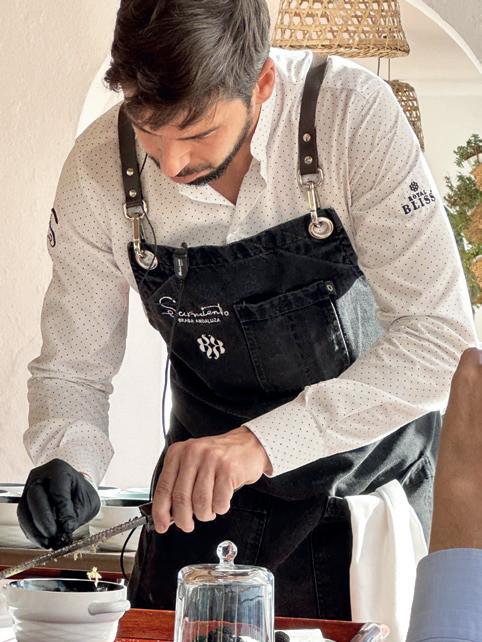
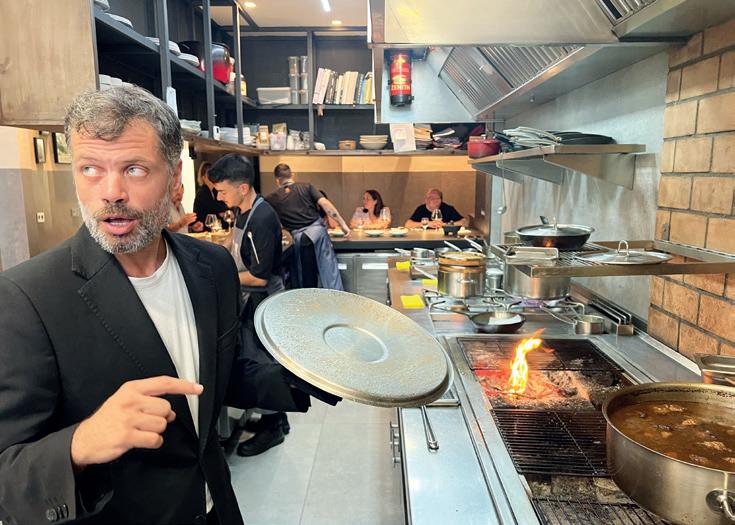

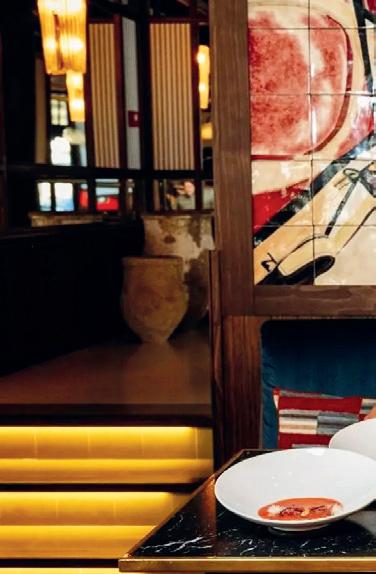

He’s got pedigree and we give this likelihood 7/10.
Madrid’s dining scene balances seasoned excellence and daring newcomers. Quique Dacosta’s Deessa, which has two stars, sets the benchmark for innovation, and is one of the most beautiful restaurants the Olive Press has ever reviewed. Our tip: 8/10. Meanwhile CEBO, run by Javier Sanz and Juan Sahuquillo, and La Tasqueria under Javi Estevez, both with one star, are hoping for upgrades. The latter is the most likely to get it. Up in Barcelona chefs like Jordi Tarre of Prodigi and Riccardo Radice of Fishology are crafting inventive tasting menus that flirt with second-star potential, while Oliver Pena at Teatro Kitchen & Bar and German Espinosa with Diego Mondragon at MAE Barcelona embody the city’s avant-garde spirit.
In the Basque Country and smaller regional
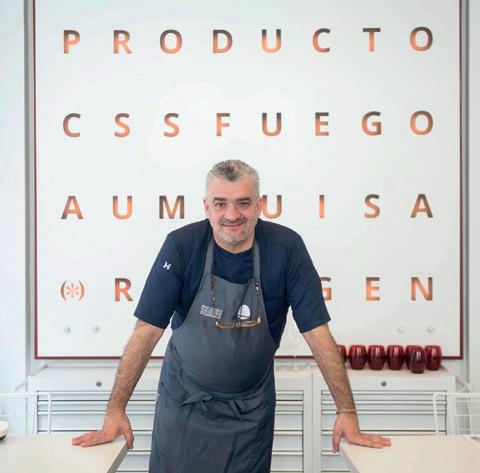
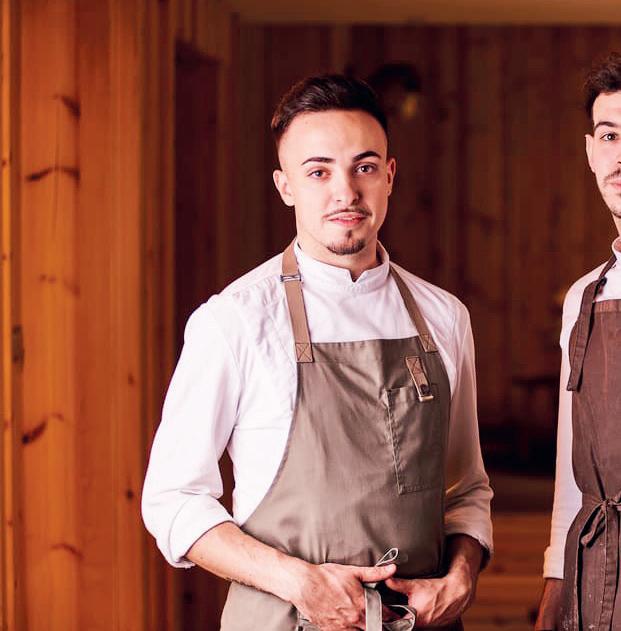
Designed by Rachel Gore
Spain’s expat capital, reaches a global milestone, explains Dilip Kuner
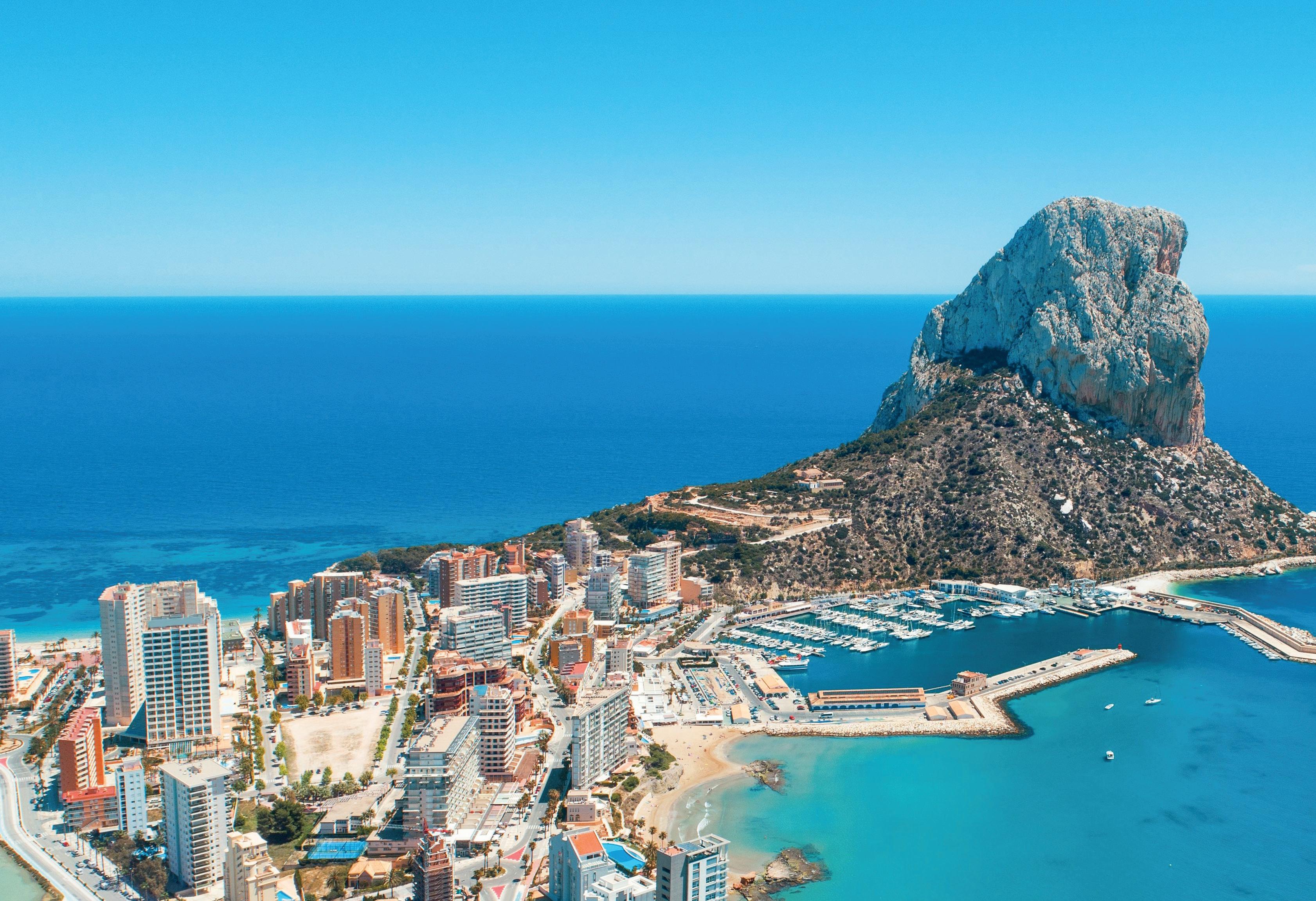
THE
fi rst time I visited Calpe, I was convinced I’d walked into the wrong country. It wasn’t the sun that threw me off, or even the Peñon de Ifach looming over the bay like some monumental guardian – it was the voices.
English drifted from a bakery queue, Dutch from a nearby café, and German from a couple
arguing amiably over sunscreen. Then someone greeted me in Valencian, and I realised this wasn’t confusion – it was Calpe. And it turns out my ears weren’t exaggerating.
The town recently crossed a quietly astonishing milestone: foreign nationals now make up over half of its population. More than 53%, to be exact – meaning Spanish residents are
technically the minority in this stretch of the Costa Blanca. It’s the only town in Spain with more than 20,000 people to reach that level of international mix.
But statistics don’t quite capture it. You feel it on the street. The conversations switch languages mid-sentence, and the menus carry three translations as naturally as a tri-
lingual child. Calpe, once a sleepy fi shing town, now beats to a global rhythm. And this shift has changed everything – not just the faces in its markets, but the entire logic of how it lives and breathes.
Continues on next page

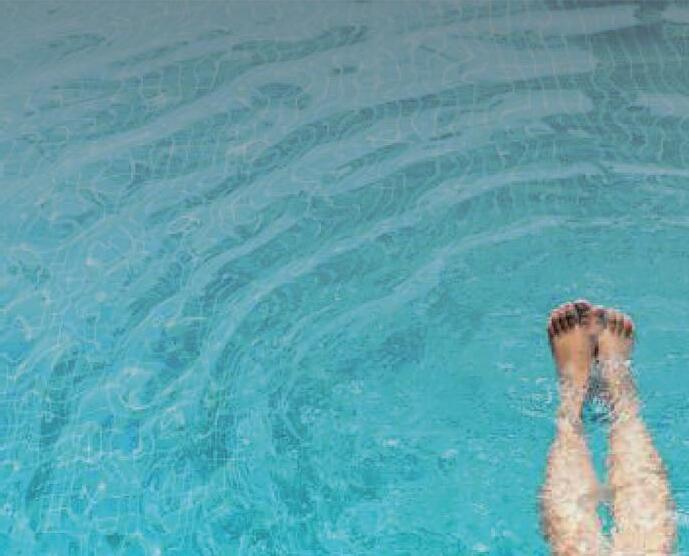




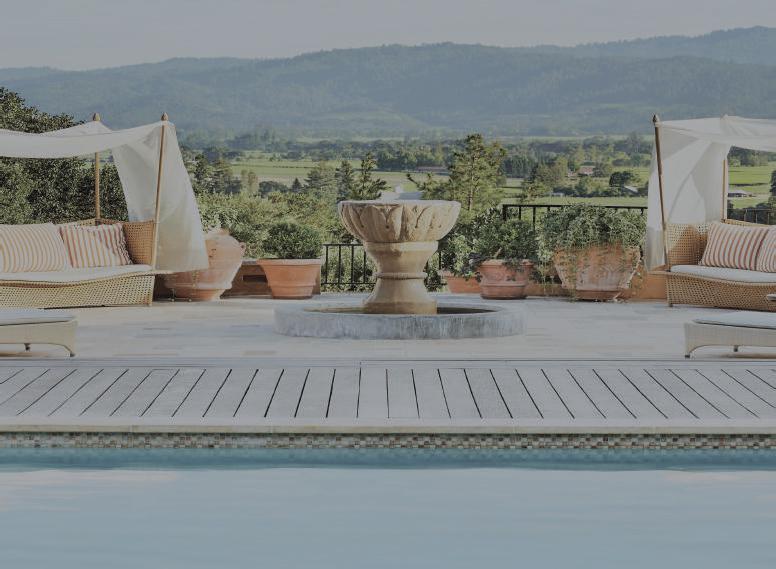
To truly understand Calpe’s identity, you need only look a few kilometres down the road to its neighbour, Altea. Where Calpe is vertical, cosmopolitan, and intensely practical, Altea is horizontal, artistic, and gently Bohemian.
Altea’s Old Town, with its blindingly white stucco buildings and blue-domed church, climbs from the shore up a soft hill, attracting painters and photographers.
Calpe, meanwhile, is the place where people actually live and work yearround, seeking out the easy access to services, the large flat beaches, and the steady, global pulse.
It’s this dynamic - Altea offering the Spanish coastal dreamscape and Calpe providing the reliable, international infrastructure - that makes this stretch of the Marina Alta so unique.
For decades, coastal towns here thrived on a seasonal heartbeat: crowded summers, empty win-
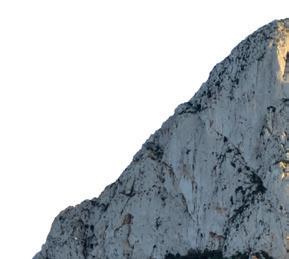
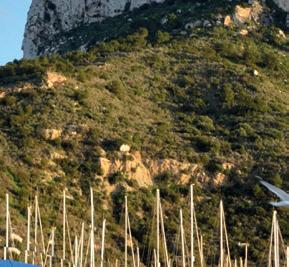
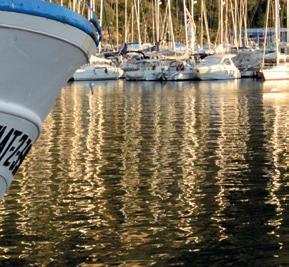
ters. But Calpe and Altea have broken that cycle. The foreign residents didn’t come for a fortnight; they came to stay. They needed schools, doctors, plumbers, yoga teachers... They didn’t vanish in October.
So now, even on a chilly Wednesday in January, you’ll find restaurants open, cyclists speeding past the promenade, and the scent of fresh coffee floating from bakeries that once shuttered for the season.
This year-round pulse has sparked a quiet revolution. The town’s mild winters and mountainous backdrop make it a magnet for cyclists and hikers escaping northern cold. You see them every morning, groups in bright Lycra pedalling through the mist toward the Sierra de Oltà, the clatter of gears echoing against limestone cliffs.
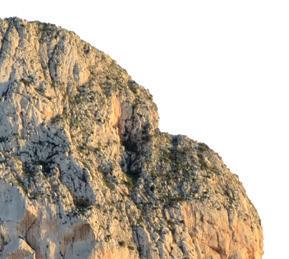
The air smells faintly of sea salt and new tarmac.
But life here isn’t just about sport. It’s about balance – a kind of comfort-
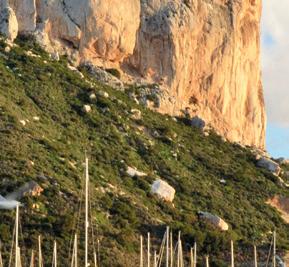
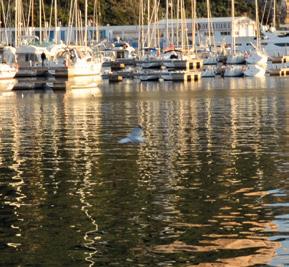
able coexistence between Spanish tradition and European convenience.
Klaus Schmidt, a German expat who moved with his family five years ago, puts it simply: “We came for the weather but stayed because of how easy everything is. My kids go to a local school, but play football in English. I go to a Spanish doctor, but my physio speaks German. We don’t have to choose between home and here. Calpe gives us both.” Walk through town and you’ll see what he means. There’s a language exchange in the main square every Thursday, chatter spilling from tables like music.
Hiking clubs meet at dawn by the Peñón’s trailhead. You’ll even hear a bit of Russian at the market when haggling over oranges.
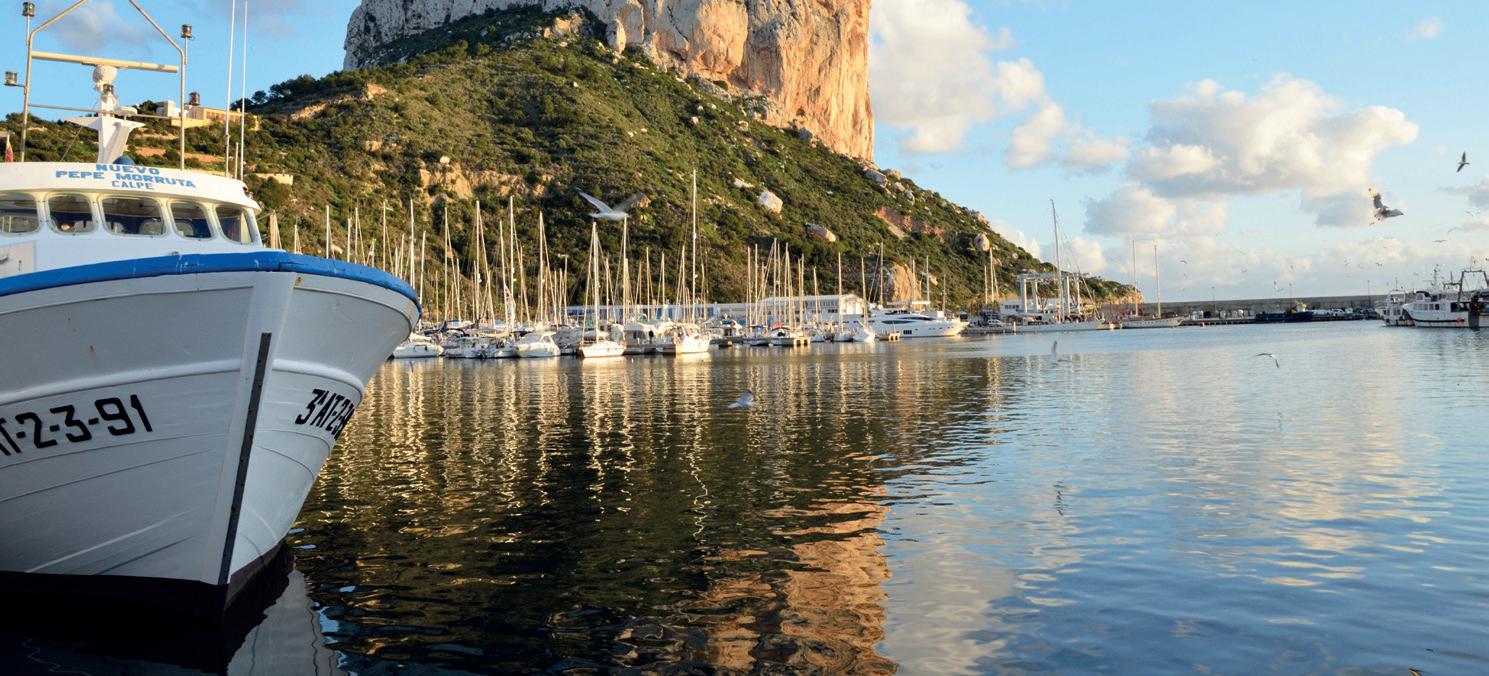

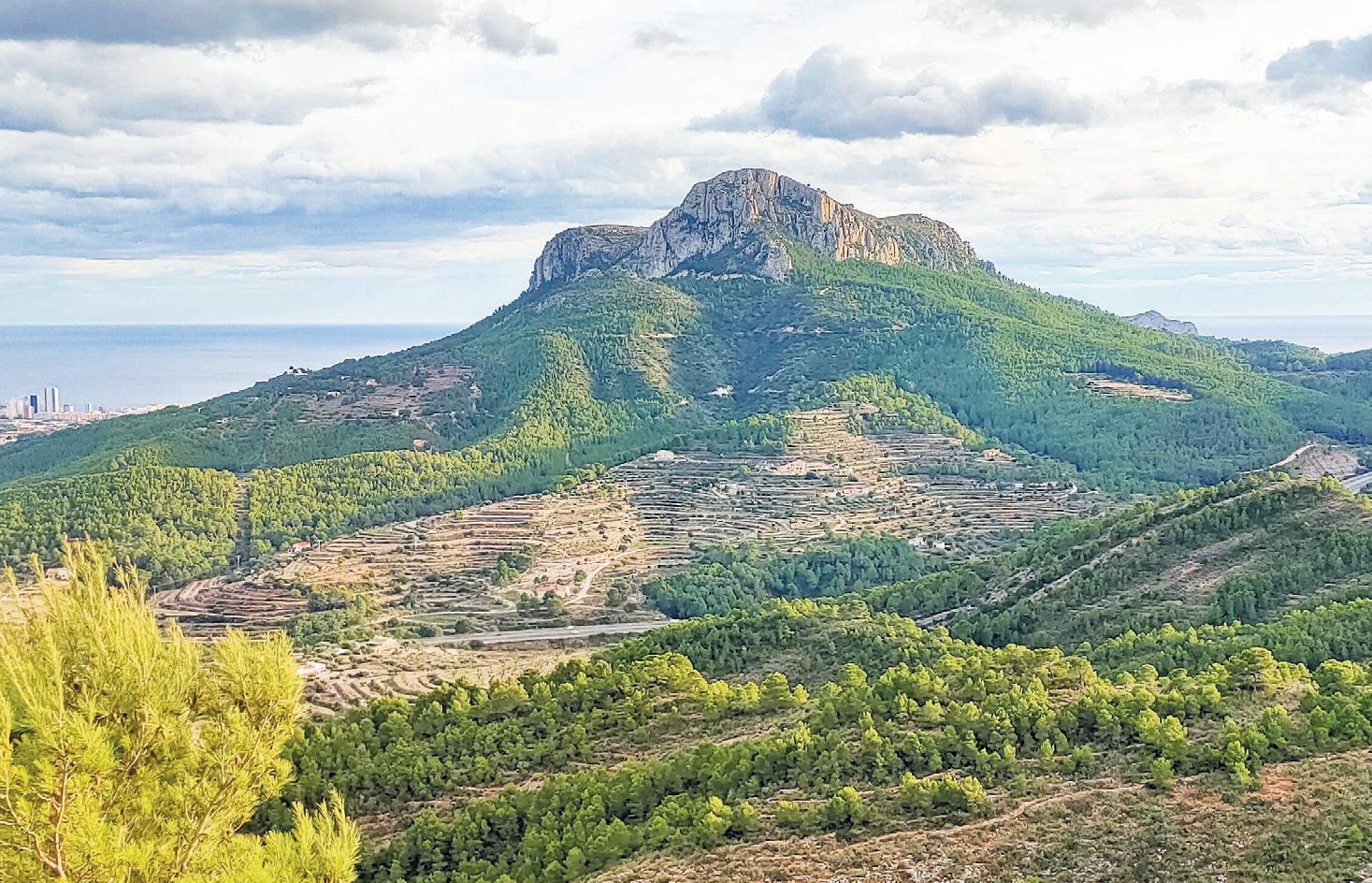
Yet beneath this international blend, Calpe still hums with its Valencian roots – the smell of paella on a Sunday, the rhythmic thump of fiestas, the patience of fishermen mending nets by the port.
Still, this success brings growing pains. The population density near the seafront can feel suffocating in August, and parking is a local legend in itself.
The council has started tackling
these pressures: better waste management, greener transport options, and even a beach smoking ban (which, to be honest, makes the sea air cleaner and the sand less of a cigarette graveyard). These aren’t glamorous reforms, but they signal something rare for a tourist town – long-term thinking. And maybe that’s the real story. Calpe’s charm isn’t in pretending to be Spanish or international, old or modern – it’s in managing to be all of it at once.
The Rock stands immovable, yes, but the community below it shifts and adapts like the tide. And on certain evenings, when the sun slips behind the Peñón and the sky turns a slow copper, you can’t help wondering if this small town on the Costa Blanca hasn’t quietly reinvented what Europe itself looks like – a place where nobody quite belongs everywhere, yet everyone belongs somewhere.




SPECTACULAR:
Calpe, its beaches, harbour and lagoon as seen from the top of the Peñon
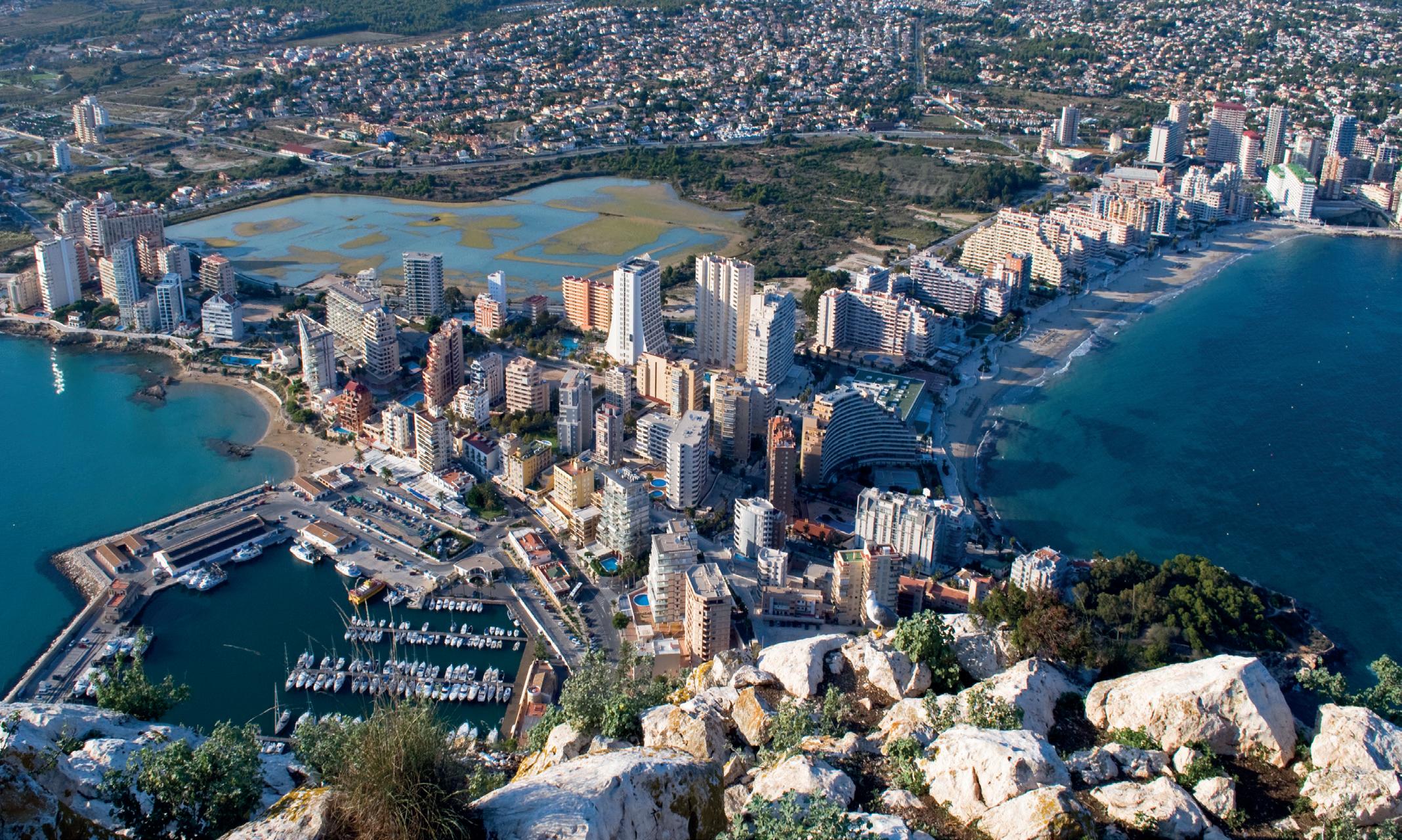
You can’t really understand Calpe until you’ve climbed the famous Peñon.
From afar, it looks manageable – like a giant’s knuckle rising from the sea. Up close, it’s something else entirely.
I still remember my first climb: the screech of cicadas, the smell of hot dust, the wind whipping grit into my mouth as I gripped a rusted chain and thought, perhaps foolishly, “How hard can it be?” The path starts gently enough, winding through rosemary and pine. There’s a point about halfway up where you hit the tunnel – a rough, unlit bore through solid limestone. It’s cool and damp, the air thick with the smell of stone and moss. You emerge blinking into sunlight, only to realise the real climb is still ahead: steep, narrow, and scattered with loose rock. Yet every step brings a bigger view, until finally you reach the summit – 332 metres above the sea – where the world unravels in every direction. Altea shimmers to the south, Moraira to the north, and far below, the Mediterranean stretches like polished glass. Access past the tunnel is now limited, which makes sense. Too many feet wore down the rock. Visitors must book online, which, depending on your patience for bureau-


cracy, is either a minor inconvenience or an environmental victory. Still, it’s worth it. The Peñón isn’t just a climb; it’s a conversation with the landscape. You see gulls riding thermals, and if you’re lucky, a kestrel hovering mid-air like a thought that refuses to land.
Just across the road, Las Salinas offers the perfect counterpoint – horizontal calm after vertical effort. The salt lake glimmers like liquid silver, sometimes pink, depending on the season and the whims of its microorganisms. In the late afternoon, when the light hits it right, the reflection of the Peñón on that rosy water feels almost unreal, as if nature decided to play at being an artist.
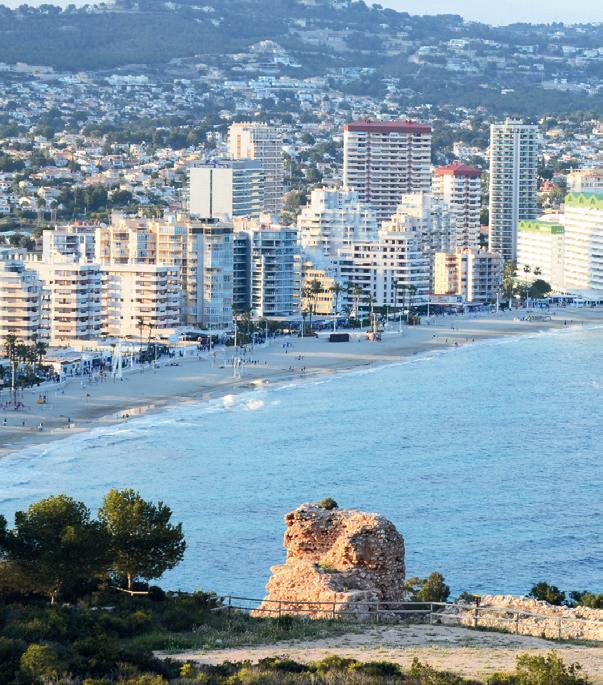
Once used for salt production, Las Salinas is now a protected habitat, home to waders and flamingos. You’ll spot them standing like question marks in the shallows, their pale feathers tinged with blush. The soundscape here is delicate – soft wind, occasional car, and the odd squawk of a startled bird. It smells faintly briny, like tears drying on skin.



down to take it’s

Both the Peñón and the salt flats are fragile, so locals ask visitors to tread gently – stay on marked paths, keep voices low, and take your rubbish home. It’s not about rules; it’s about respect. After all, these landscapes existed long before us and, if treated right, will outlast our noise and sunscreen and selfies.



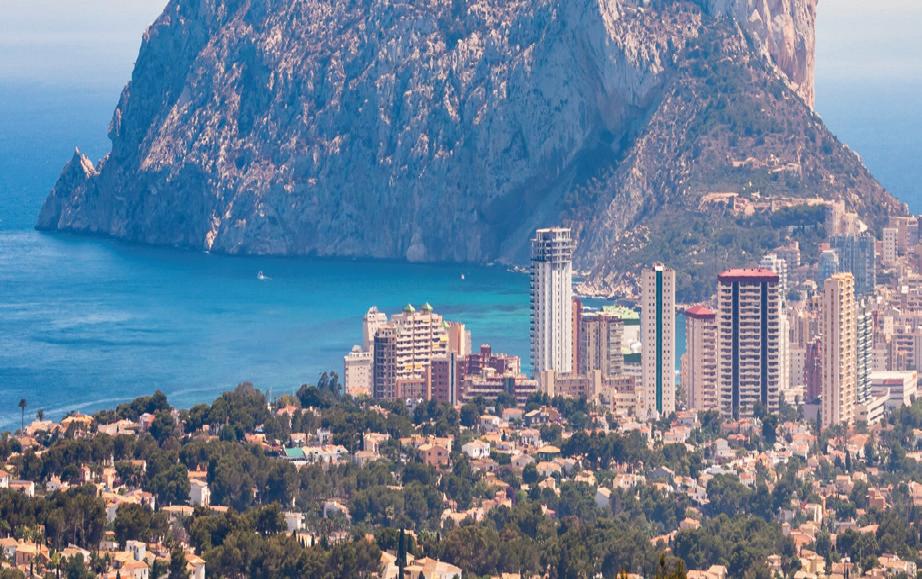
And standing there between rock and water, you can’t help noticing how these two opposites – the towering vertical and the shimmering flat – define Calpe’s character.
It’s a town built between extremes: stone and sea, noise and silence, old and new.
Which makes you wonder, as the flamingos lift off in slow pink arcs, whether balance is ever really still – or if it’s just the art of constant adjustment.
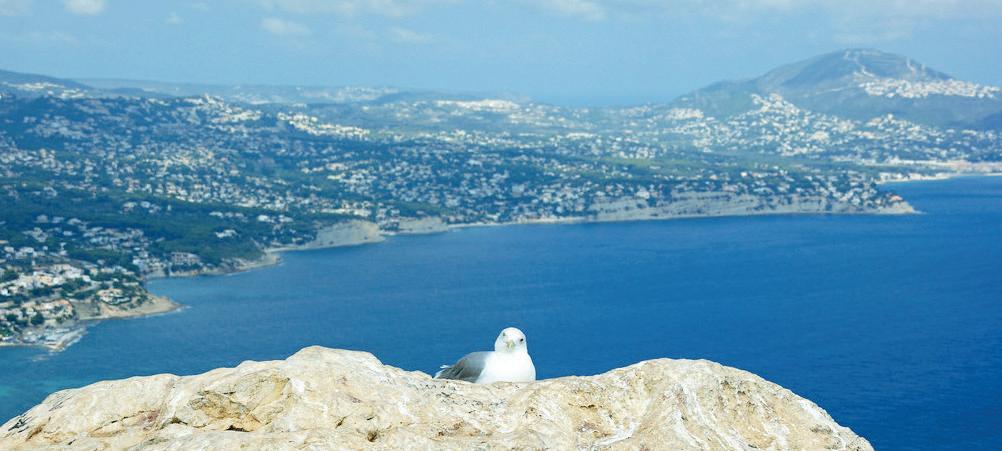






FOR over 25 years, Hamiltons of London has been helping thousands of clients buy, sell, and rent property in the beautiful northern Costa Blanca region of Spain.
From coastal beaches to peaceful inland valleys, our approachable and multilingual team offer in-depth local knowledge and a personal approach to every transaction.
If you're a seller ready to unlock the value of your home, we're eager to partner with you. Our proactive marketing and innovative strategies reach global buyers. With expert valuations, photography, videos and targeted exposure, we'll attract serious offers - join our growing list of satisfied vendors who've achieved outstanding results. Buyers, discover your dream: whether a seaside apartment, mountain retreat, or luxury villa, we'll understand your needs and match you perfectly.
Our team guides you every step, from exclusive listings to a comprehensive finding service via trusted local partners, securing the best homes at the right price.
For landlords, our dedicated management handles longterm rentals seamlessly. We handle marketing to attract top tenants, thorough referencing, contract prep/renewals, communication, rent collection, inspections, and repairs/maintenance - easing all burdens for seamless long-term rentals.
Based in five convenient offices: Moraira as our head office, Jalon covering the inland areas plus Denia, Jávea, and Calpe, and our new office in Altea serving from Altea to Finestrat.

It’s hard not to grin when someone tells you that Calpe’s Queen’s Baths were never actually baths. I first went expecting marble pools and mosaics, maybe even a faint echo of some longdead empress lounging in the steam. Instead, I found rocky tidal pools, rough and sunlit, carved straight into the coast. Turns out, the Romans weren’t bathing here at all – they were farming fish.
The Baños de la Reina date back nearly two thousand years, a complex of stone basins connected by little canals where sea water flowed in and out. Standing on the edge, you can still see the grooves cut for sluice gates. If you crouch low enough, you’ll catch the faint smell of salt and seaweed, the same scent Roman workers must’ve known. And yes, you can still swim there, right beside those ancient cuts in the rock, floating where once mullet and bass fattened for the empire’s tables. There’s something almost cheeky about that –the Mediterranean shrugging at time. Just inland, the Old Town is a different story altogether – narrow lanes, worn steps, flashes of colour from painted walls and flags. The Torreó de la Peça stands sentinel, a reminder of the town’s medieval defences. And yet, just beyond its shadow, a staircase painted like the Spanish flag draws Instagrammers like moths. The clash between centuries feels deliberate, like Calpe refuses to choose which version of itself to present.
One evening, wandering through the cobbles, I stopped at a bar where locals argued about football while a British couple asked for directions in halting Spanish. A mural of a woman’s face (pictured right) stretched across the wall, her eyes bright blue and slightly too large – the artist’s mark of modernity. That mix, that layering, is Calpe in miniature: ancient engineering underfoot, street art overhead, and the sound of half a dozen accents bouncing off the stones.
The link between past and present runs deeper than aesthetics.
The Romans built their fortune on salt and fish. Calpe still trades in both. From the Baños to the fish market, the same sea provides. It’s continuity disguised as change. And maybe that’s why this town feels so grounded – its roots aren’t in nostalgia but in persistence.

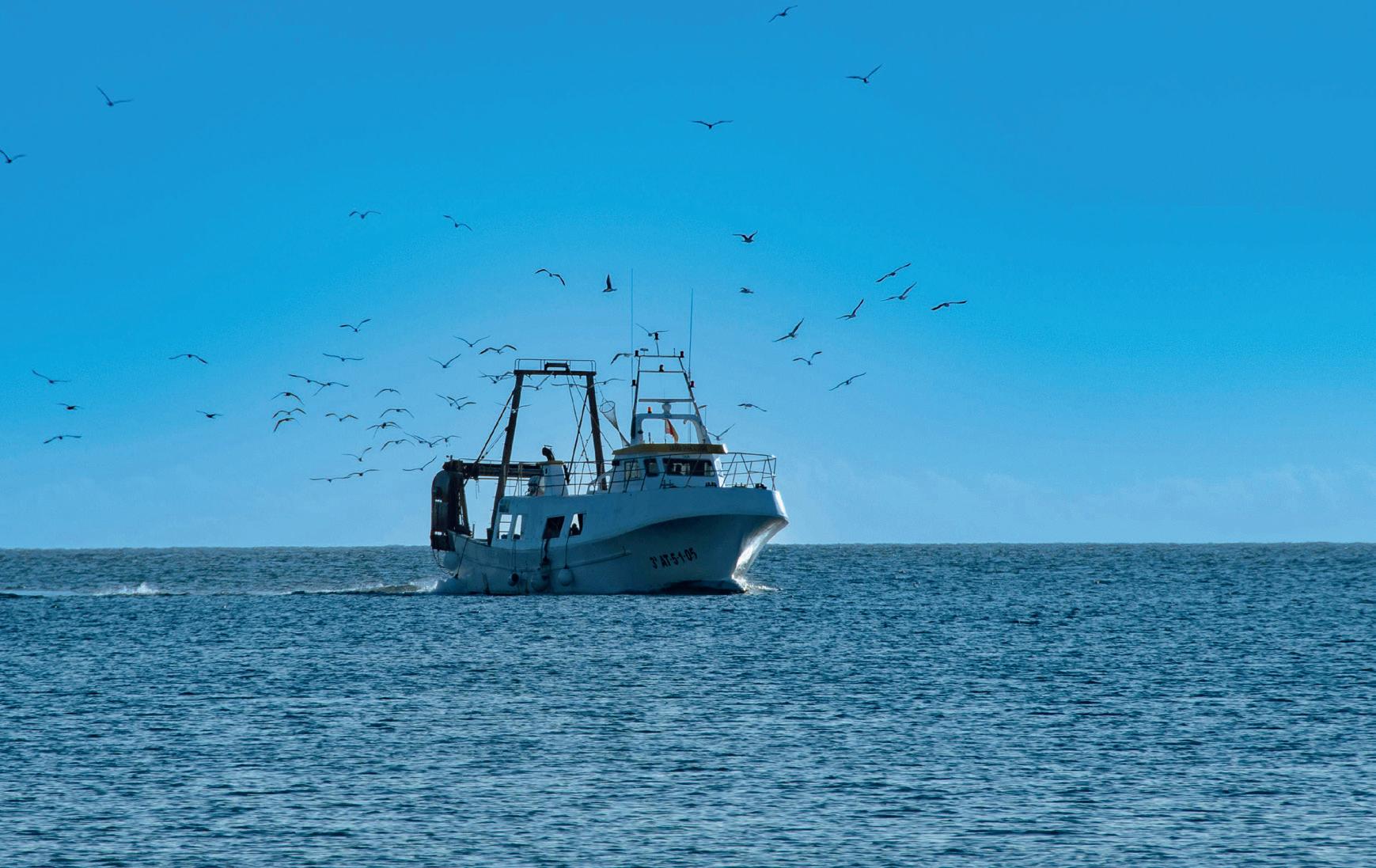
If you want to feel Calpe’s heartbeat, skip the museum and head to the port at fi ve in the afternoon. The fi shing boats return just as the light begins to mellow, their engines grumbling like tired beasts. The air smells of diesel, salt, and wet rope. It’s loud, messy, and completely un-
romantic – which is exactly why it’s perfect.
At La Lonja, the daily fi sh auction begins. Fishermen haul in crates of gamba, squid, and gleaming dorada, while buyers watch from a glass gallery above, fi ngers twitching on electronic pads. The speed of it is astonishing – bids fl ash, numbers change, and within minutes, today’s catch is already spoken for. Below, you hear the thud of
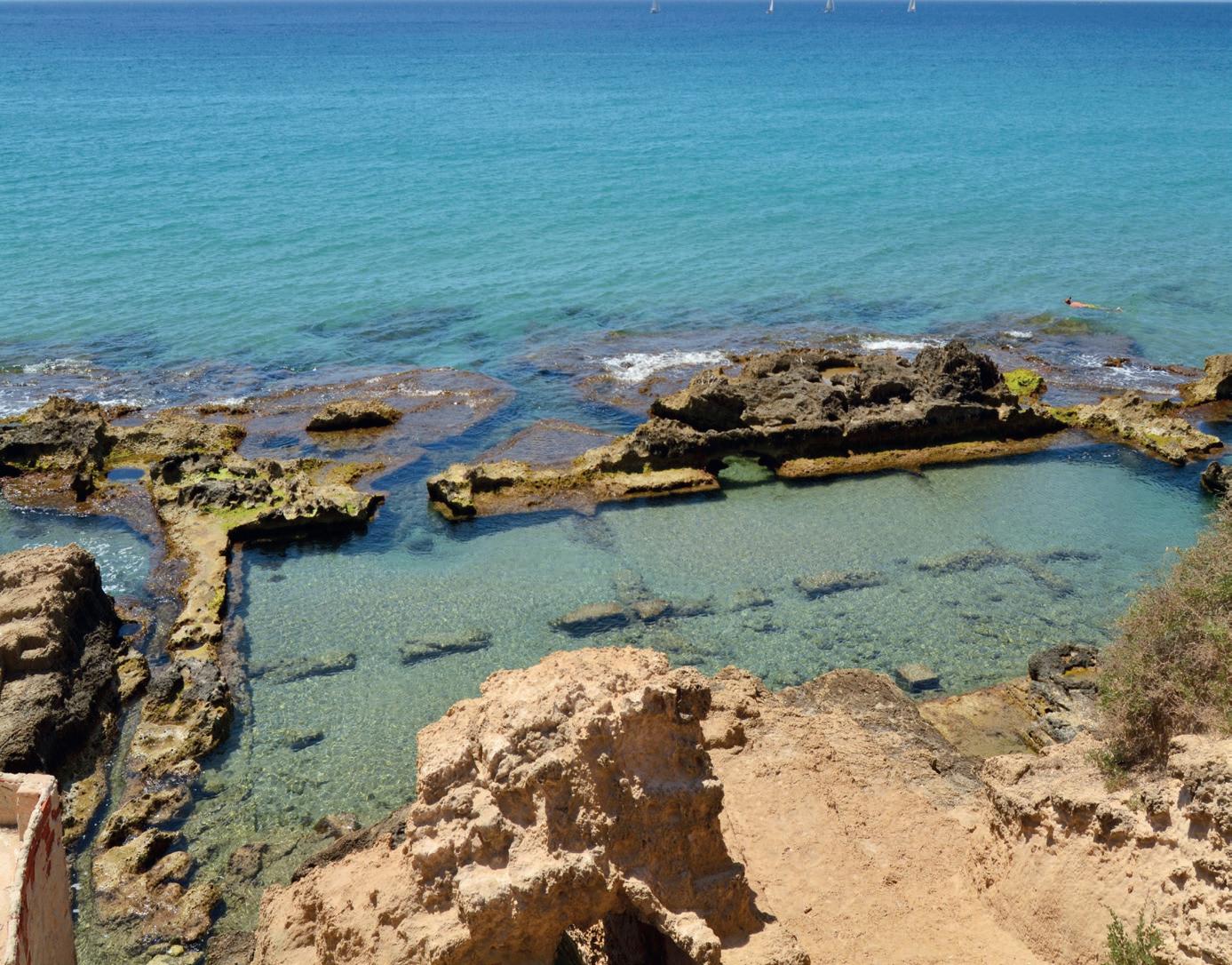

crates, the scrape of metal on tile, and the constant low murmur of negotiation. Visitors can watch, though you’re wisely kept out of the way. The best part comes after, when the restaurants by Cantal Roig beach fi re up their grills. If you time it right, you can eat the same fi sh you saw unloaded an hour earlier. Calpe doesn’t pretend. It works. It sweats. It serves food that’s better than it looks because it hasn’t been polished for tourists. The prawns are scarlet and sweet, the arroz del senyoret rich and sticky. Eat with your hands, wipe your mouth on a napkin, and watch the sky turn from gold to
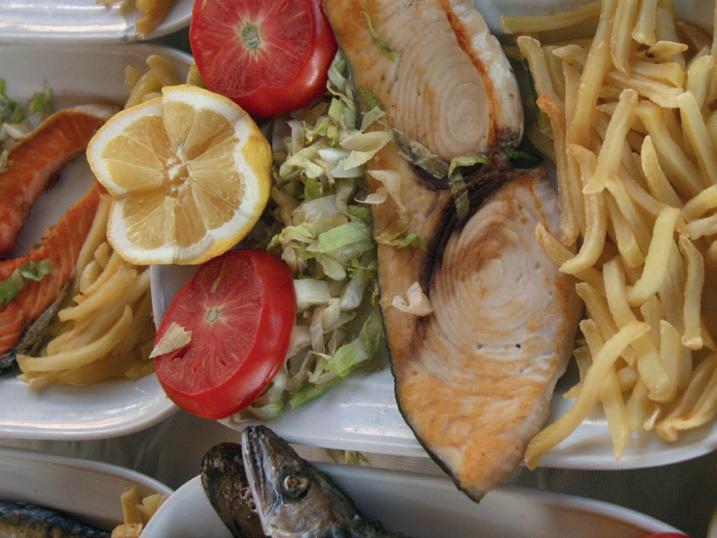
violet over the Peñón.
And maybe that’s the perfect ending to a Calpe day – not the climb, not the history, but the table. Sitting there, salt on your lips, sun on your skin, watching boats bob against their reflections, you realise that this small town manages to be ancient and modern, foreign and familiar, noisy and peaceful all at once, as if the Peñón itself breathes out a rhythm that everyone unconsciously follows – and isn’t that, in its quiet way, what every town is trying to become?







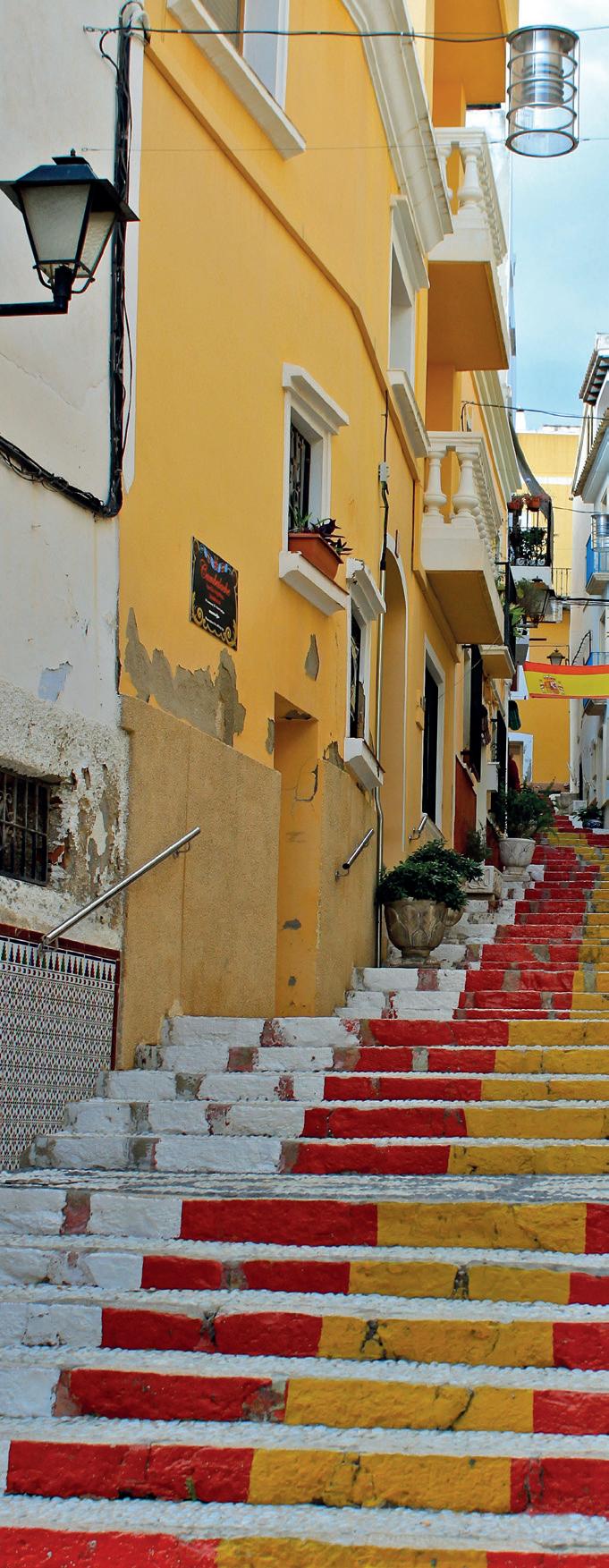



But











FORGET what you think you know about the Costa Blanca. Sure, there are the skyscraper resorts and sprawling, sun-drenched sands, but tucked between the jagged peaks of the Sierra de Bernia and the dazzling turquoise sea lies a town that moves to a slower, more romantic rhythm: Altea.
If you’re anything like me, you crave authenticity on holiday – and that’s exactly what Altea de-
somehow managed to hold onto its soul despite its growing popularity.
delivers.


Often described as one of Spain’s
most beautiful villages, it has

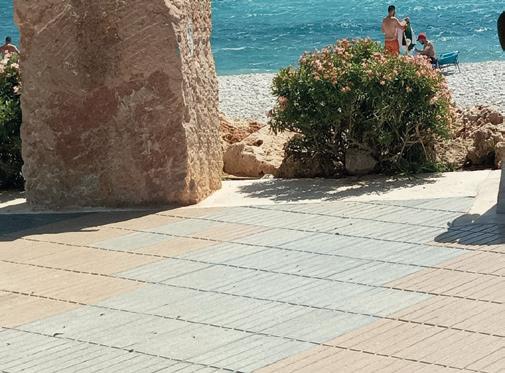

Your first mission? Head straight for the Casco Antiguo – Altea’s Old Town. I’m not going to lie, the climb’s a bit of a workout, especially on a scorching August afternoon, but trust me, it’s worth it. Don’t stress about a map – just let the maze of steep, cobbled alleyways guide you. Every turn offers a new photo waiting to happen: whitewashed houses offset by cascades of fuchsia bougain-




villea spilling from balconies. Eventually, you’ll stumble, a little breathless, into the Plaza de la Iglesia, the town’s spiritual and geographic heart. And there it is – the Church of Nuestra Señora del Consuelo. Those famous blue-and-white tiled domes, visible from almost anywhere on the coast, really do pop against the brilliant Spanish sky. Pull up a chair at one of the cafés, order a café con leche, and just take it all in. Then wander to the nearby Mirador de los Cronistas de España – that view will steal your breath faster than the climb did. Altea’s reputation as an artists’ haven is clear the minute you start browsing. This isn’t your standard souvenir fare – the

Old Town is filled with genuine art galleries and small studios where local ceramists, painters and jewellers actually work.
ning stroll.
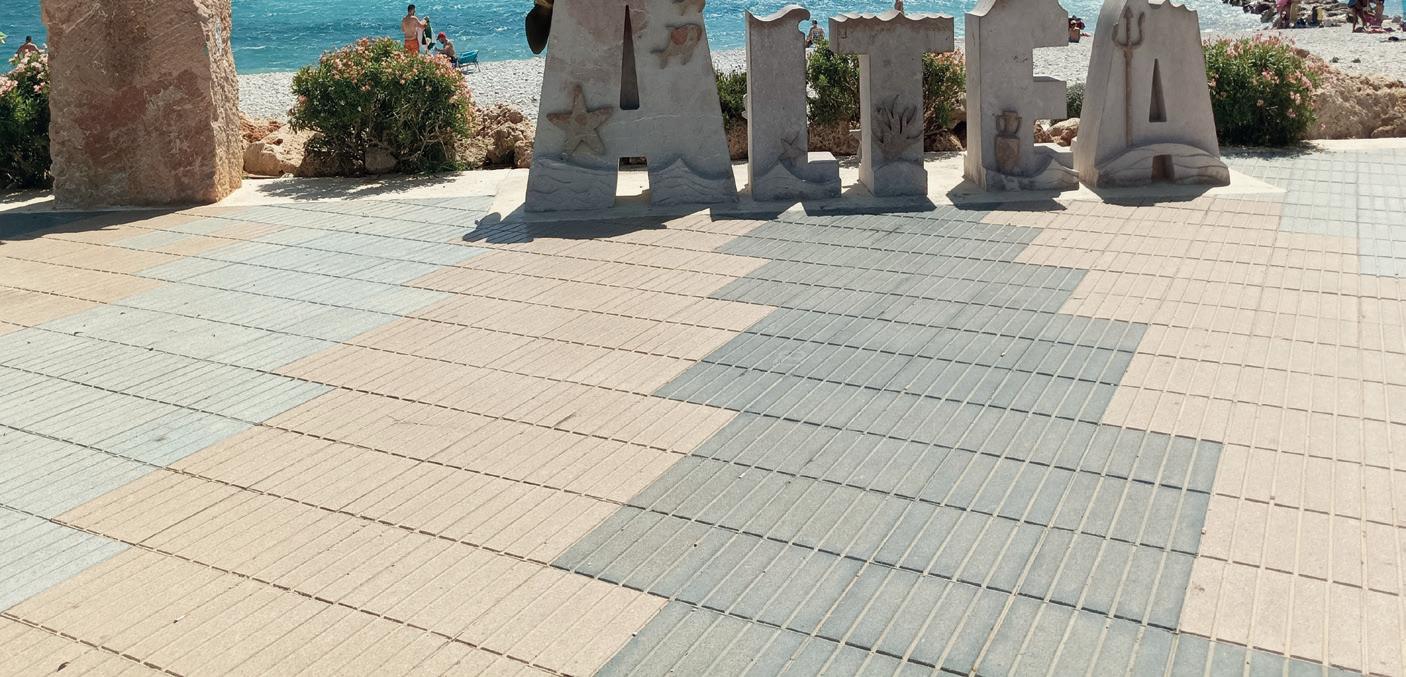
Better be safe than sorry by getting a proper structural survey done
ALTHOUGH some estate agents still claim that ‘they don’t do surveys in Spain’ structural surveys (also called home inspections) are available locally and are just as worthwhile as in any other part of the world.
Buying a property is a big investment for most people, so it makes absolute sense to know what you are buying, identify any signifi cant defects early, and use this information when making an offer.



The result is a distinctly bohemian feel, especially in the evening when artisan stalls spill into the streets and the scent of jasmine mingles with grilled prawns drifting from hidden courtyard restaurants.
The beaches here aren’t your typical golden stretches – and that’s a good thing. Altea’s shores are mostly made up of clean, smooth pebbles, which keep the water crystal clear and lend the area a quieter, more relaxed feel than some nearby resorts.
Playa de la Roda is the most central, running alongside the lively Paseo Maritimo, perfect for an eve-
For a calmer spot, head north towards Cap Negret. And for something truly different, check out Marina Greenwich – promotional materials claim it sits exactly on the Prime Meridian (000° 00′ 00″), making it a fun geographical talking point even if that fact is more symbolic than scientific. Need a break from the sea? Altea’s got you covered. The Sierra de Bernia and Serra Gelada Natural Park both offer unforgettable hiking. Some routes are rugged and best tackled with proper shoes, but there are gentler options too –like the scenic trail to the Faro de l’Albir lighthouse just outside town, where the dramatic coastal
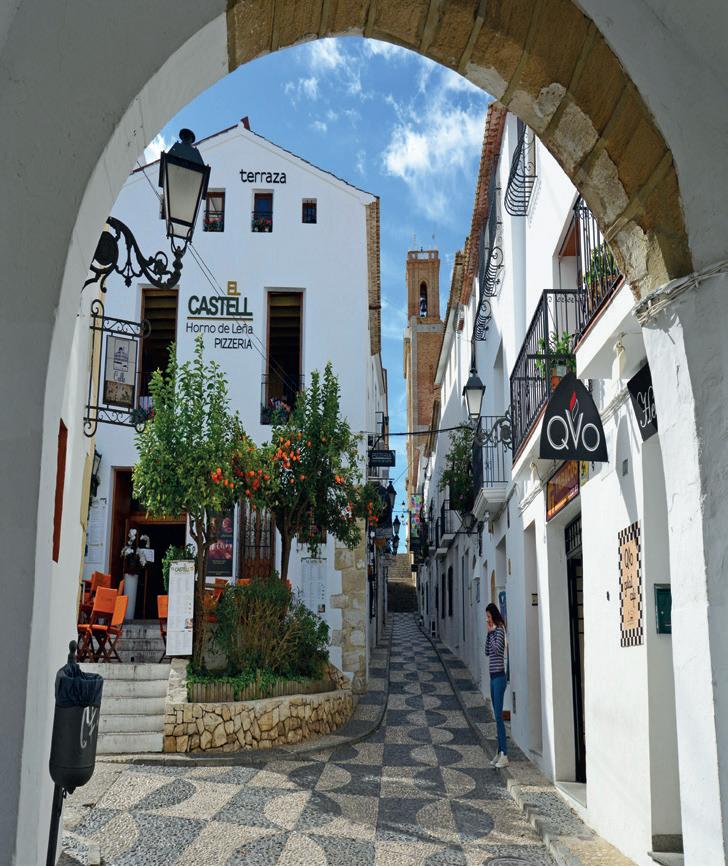

views are reward enough. If you visit on a Tuesday then don’t miss the bustling Altea Market. From fresh oranges and olives to local ceramics and handmade crafts, it’s a proper slice of local life – lively, colourful, and perfect for picking up authentic gifts.
Altea is special. A town that’s resisted the excesses of mass tourism, keeping its quiet dignity and undeniable charm. Go, wander, climb, and let this white jewel of the Mediterranean cast its spell. You won’t regret it.
The results of a survey might well help you negotiate a lower price or sometimes the survey will confi rm you are getting a great deal or even save you from a troublesome property.
For



If you cannot arrange a survey before paying a reservation or deposit a ‘subject to survey’ clause can be included when making payments (provided all parties accept).







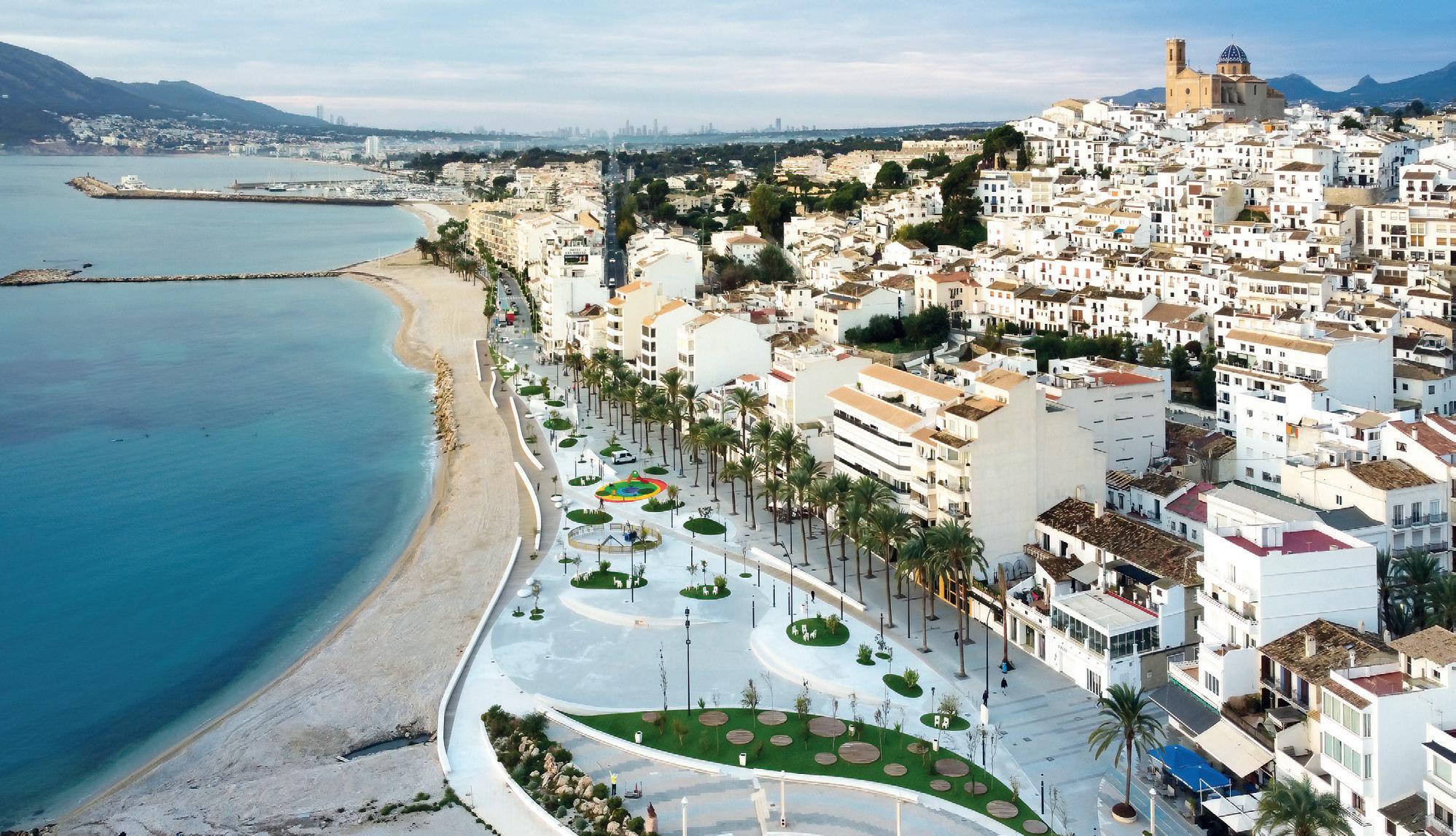
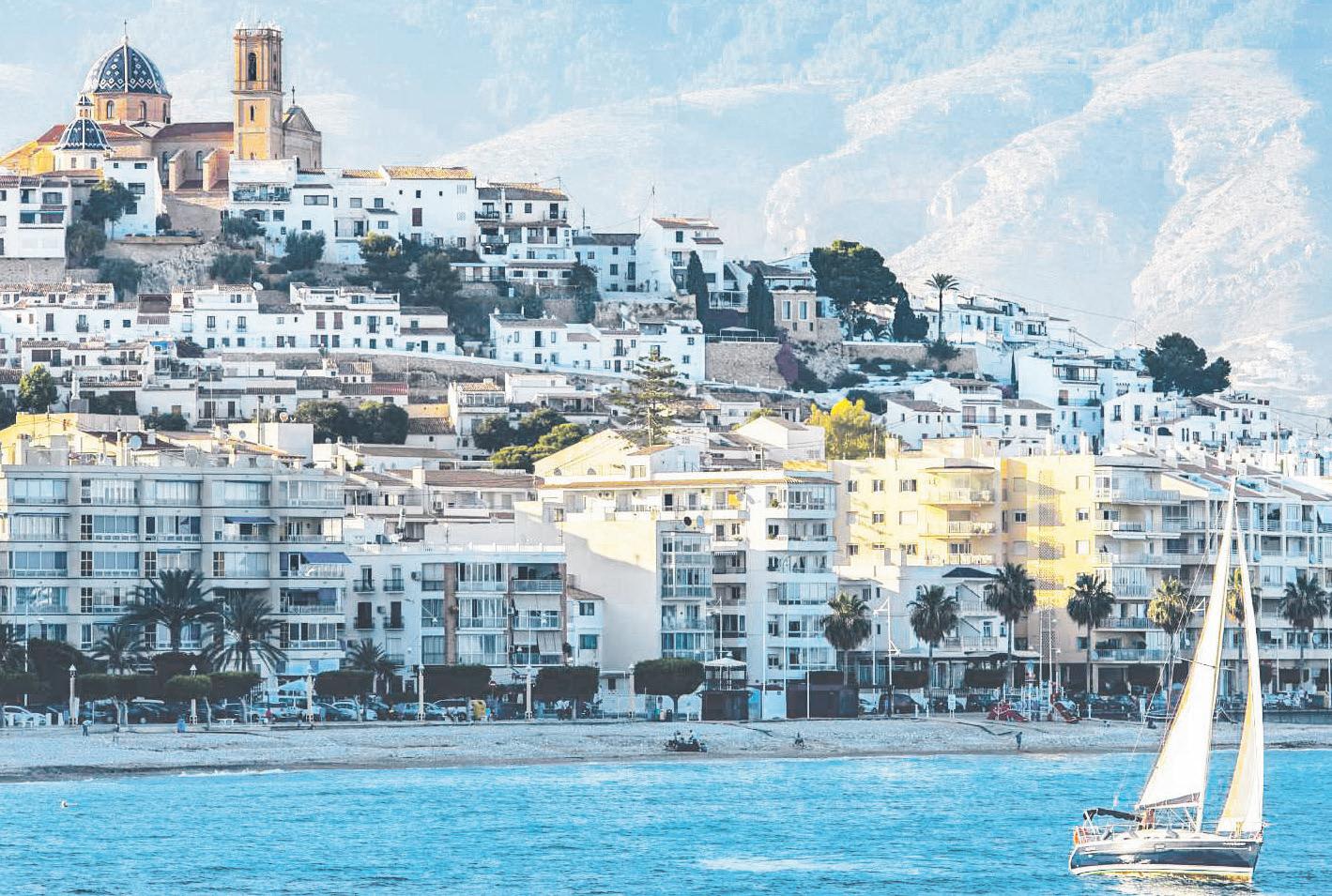

ALTEA: Its blue domed church dominates the skyline

Jávea · Moraira-Benitachell
ORKSHIRE Linen has over 20 years experience in home furnishing. Both our shops in Jávea and Moraira-Benitachell have everything you need to make your home comfortable all year round. Duvets with matching pillow cases, fitted sheets, blankets, toppers, mattress and pillow protectors, rugs, towels... the list is endless at Yorkshire Linen!
An electric blanket is cheaper than a heater because you would only warm the bed and not heat the entire room while you sleep.
Try and set it at a reasonable temperature to keep the costs down even further and stop you roasting during the night. Alternatively, you could also just turn it off once you’ve put your head down.
Curtains are really useful for all sorts of reasons. Apart from adding atmosphere to a room, there are weather reasons. For example, if it’s windy and/or raining outside heat loss from the home will increase. Blinds are great for blocking out all or some light and for privacy. Seasonal collections arrive weekly in our Jávea or Moraria-Benitachell shops. We have everything you need from indoors to outdoors to make big or small changes to your home or rental and our multi-lingual staff are always available to help you in any way they can.






The Agency Costa Blanca: A new standard in Mediterranean luxury
SINCE opening its doors in 2024, The Agency Costa Blanca has redefined what it means to experience real estate on Spain’s most desirable coastline. This isn’t just a brokerage - it’s a curated approach to luxury living, blending world-class service with intimate local knowledge.
Led by founding partners Alistair Barton and Leonie Ter Brugge, the team brings a fresh perspective to the Costa Blanca property market, already making an impact in Moraira, Javea, and Benissa Costa.
Backed by one of the world’s most recognised luxury real estate brands, The Agency Costa Blanca offers a bespoke experience rooted in trust, discretion, and market expertise. With a global network spanning 145 offices in 14 countries (six offices in Spain) and over $88 billion in sales, they’re uniquely positioned to connect the region’s most extraordinary homes with discerning international buyers. In fact the network consists of more than 3,500 global agents, who are all fully connected to
IF you live in Spain or elsewhere in Europe and are travelling abroad, there’s a good chance you’ve tucked your EHIC or GHIC card into your wallet and assumed you’re covered should the worst happen.
But according to a new survey by Staysure Expat, nearly 15% of English-speaking expats wrongly believe those cards give them full medical cover when travelling to the UK or across Europe.
What do the EHIC and GHIC Cover?
In reality, the European and Global Health Insurance Cards offer limited protection. They cover access to emergency state-provided healthcare, and nothing more. That means no private medical treatment, no repatriation if you need to be flown home, and no extras such as mountain rescue or private ambulance services.


The True Cost of a Medical Emergency
Even expats who return temporarily to the UK can face problems.
The NHS may not cover some treatments.
Without valid travel insurance, a sudden illness or accident could lead to thousands in medical bills — or leave you stranded overseas without a way home.
The financial impact can be devastating. Repatriation alone can bey very costly.
Last year, Staysure Expat paid out over 90,000 Euros on just one repatriation. Also, don’t forget the costs of lost luggage, cancelled flights, or other travel disruptions.
and GHIC
“It’s worrying how many people assume their EHIC or GHIC will cover everything,” says Simon McCullock, Chief Growth Officer at Staysure.


offer you an enviable service.
As the team expands to cover the North and South Costa Blanca and takes on representation of exclusive new developments, their focus remains clear: to showcase architectural excellence, lifestyle-driven design, and the best of Mediterranean living.
The Agency is the world’s most followed real estate brand - and for good reason. With award-winning marketing, a collaborative ethos, and access to a curated network of high-profile clientele, the Costa Blanca office is elevating the standard for luxury property representation in Spain.
At The Agency Costa Blanca, real estate is about more than property. It’s about people. With over half their business involving international clients, their approach is tailored, strategic, and always personal.
From high-end campaigns to in-house lifestyle publishing, The Agency Costa Blanca is more than a real estate office - it’s the new benchmark for modern luxury on the Mediterranean.

to an increase in the frequency of these distressing stories. It’s important to understand the limitations of a GHIC card. Proper travel insurance can also provide protection in case of holiday cancellation, lost baggage and other risks to give allround peace of mind.”
date a claim or severely limit your cover.
“When it comes to travel insurance, living in Spain, the onus is on the customer to be upfront about their health,” Simon adds. “At Staysure, we offer full medical screening, ensuring that at the point of need we can provide the cover that’s required — so you’ll have the peace of mind that you need.”
He explained: “These cards are useful for accessing emergency state healthcare, but they’re no substitute for travel insurance.




Without full cover, you could face both financial and emotional distress if something goes wrong. We are seeing a growing trend of older travellers with pre-existing conditions travelling further and more often, leading

The issue goes even further for those living in Spain.
Many expats don’t realise that when taking out insurance, it’s their responsibility to declare circumstances without prompt — for example, medical conditions when buying travel insurance.
In the UK, insurers are required to ask health questions explicitly, but in Spain, that onus shifts to the customer. Failing to disclose a condition could invali-
Staysure Expat, part of the award-winning Staysure Group with over 20 years of experience providing specialist insurance for British travellers and expats, offers tailored policies designed to meet the unique needs of those living abroad.
Whether you’re popping back home for a family visit or exploring new destinations in Europe, comprehensive travel insurance could be the smartest investment you make this year.




















































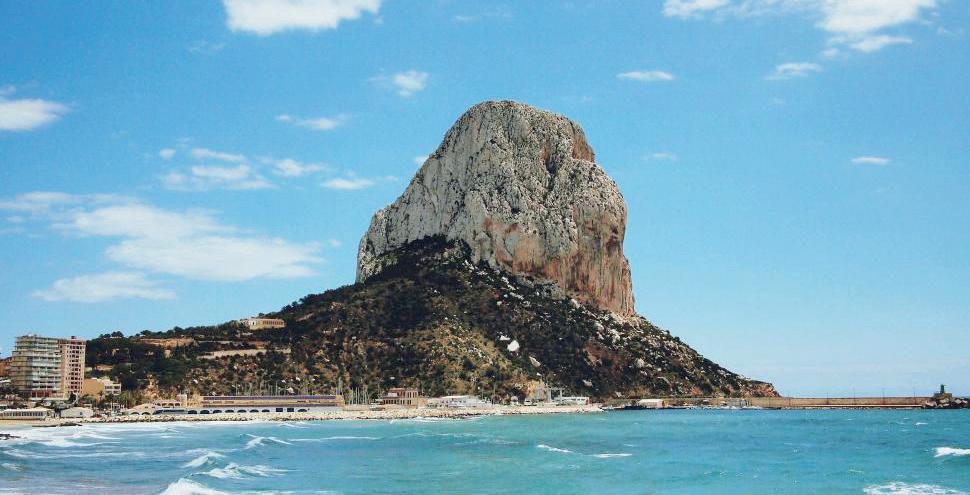


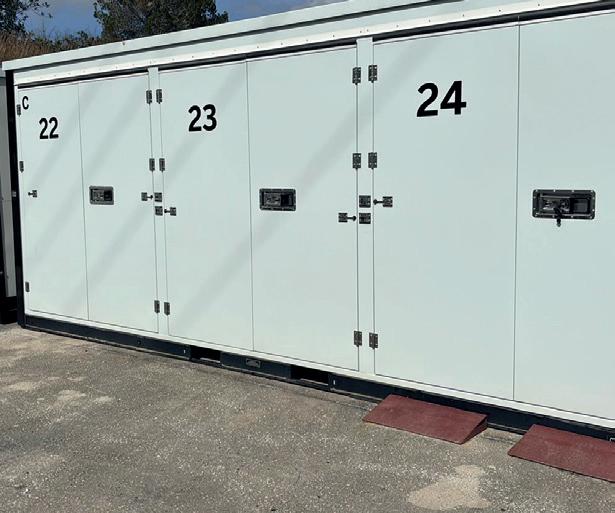

monumental Peñon de Ifach (The Rock), these beaches are wide, flat, and covered in perfect golden sand. Get ready to pose!
1. CALA DEL CANTAL ROIG (The fresh fish frenzy!)
Vibe: Authentic, tiny, and delicious!
Verdict: A tiny, protected cove that sits RIGHT next to the bustling fishing port and the incredible 2,000-year-old Roman fish farms. This is where you grab a dip after watching the fish auction! WARNING: The sand is coarser, but the proximity to the port means you can jump straight from the beach to the best seafood restaurants in town! Boat-to-plate in minutes!

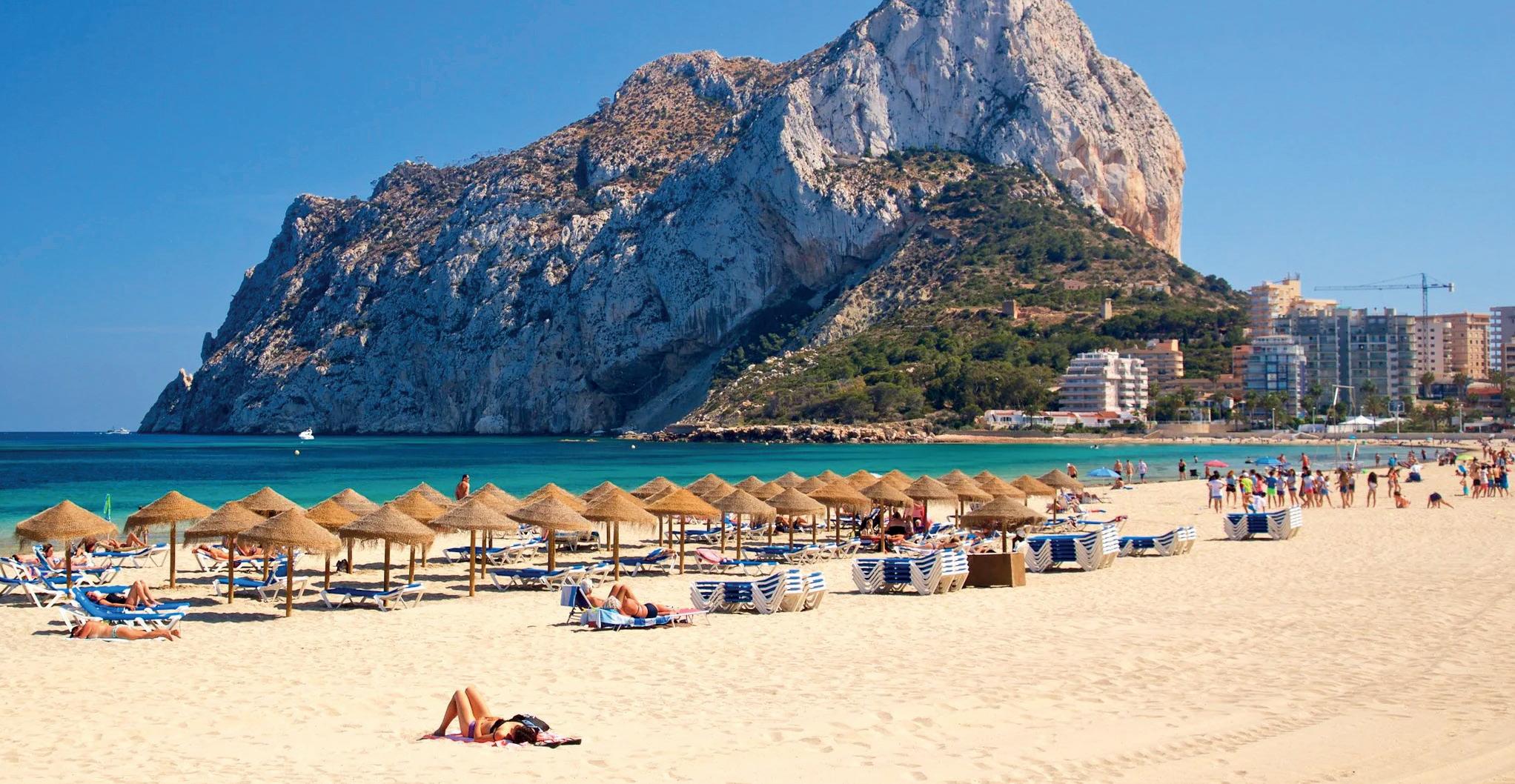

2. PLAYA DE LA FOSSA (The A-List Golden Mile)
Vibe: Electric, packed, and a non-stop party!
Verdict: This is Calpe’s absolute show-stopper! It sits on the north side of The Rock, offering views so stunning they belong on a postcard. It’s a wide, golden sprawl backed by a promenade jammed with bars and shops. The water is shallow and safe for the little ones, making it the perfect spot for a full-day family frenzy! Unbeatable for people-watching!

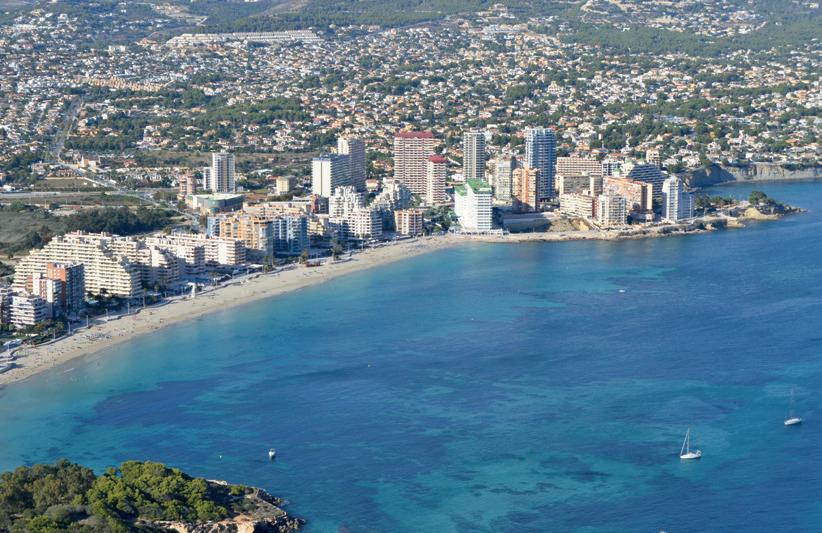
3. PLAYA DEL ARENAL-BOL (The peaceful posh spot)
Vibe: Long, relaxed, and secretly posh. Verdict: Heading to the south, this sweeping bay is the longest stretch of sand and often a slightly calmer alternative to Fossa. Its unique backdrop? The mysterious, shimmering Salt Flats (Las Salinas), which attract those beautiful pink fl amingos. Perfect for a long, quiet, celeb-style paseo (stroll) away from the madding crowds.
If you like your beaches rugged, quiet, and crystal clear, Altea is your escape! You won’t find sand here - just smooth, gorgeous grey stones (bring those water shoes, lads!) that make the water shine like a turquoise jewel.
1. PLAYA DE LA RODA
(The main event... but it’s ALL stone!)
Vibe: Central, incredibly clear, and very chic.
Verdict: This is the heart of Altea’s coastline, running below the main town. It’s super accessible and has decent amenities, but the beach is made entirely of those classic smooth pebbles. The payoff? Water clarity is astonishingly good! It’s the perfect spot to show off your new swimsuit before hitting the bohemian shops in the Old Town.
2. CALA DE LA SOLSIDA
(Warning: full nudity escape!)
Vibe: Secluded, remote, and 100% au naturel!
Verdict: This is the ultimate escape!
Tucked away north of the marina, Solsida is notoriously difficult to reach - you’ll need tough shoes and a sense of adventure. The reward is peace, unbelievably clear water, and near-total seclusion. Be warned: it is officially a naturist beach, so leave your inhibitions (and your clothes!) at home!
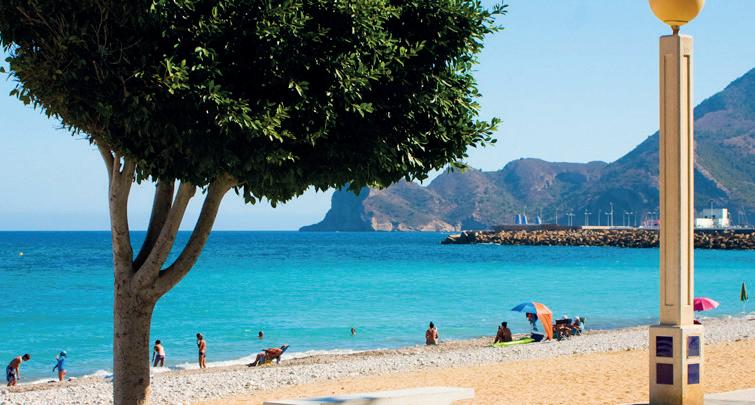
3. CAP BLANCH (The dive spot secret)
Vibe: Quiet, expansive, and natural escape.
Verdict: Running south towards Albir, this stretch of pebble and shingle is much quieter than the central beach. It’s a local favourite for tranquility and, crucially, for the spectacular water quality. If you want to snorkel or dive without the noise of jet skis, this is your hideaway!
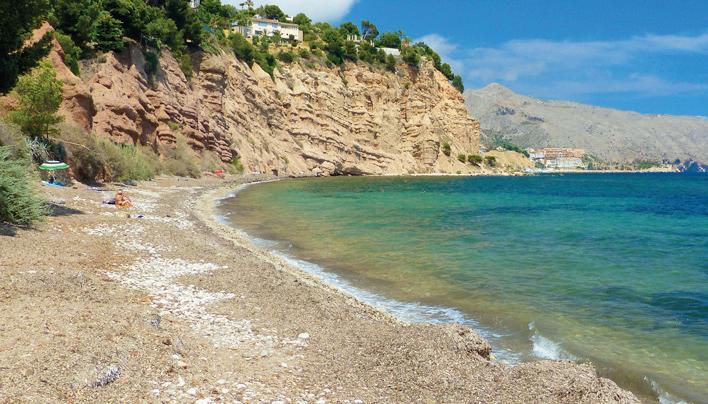


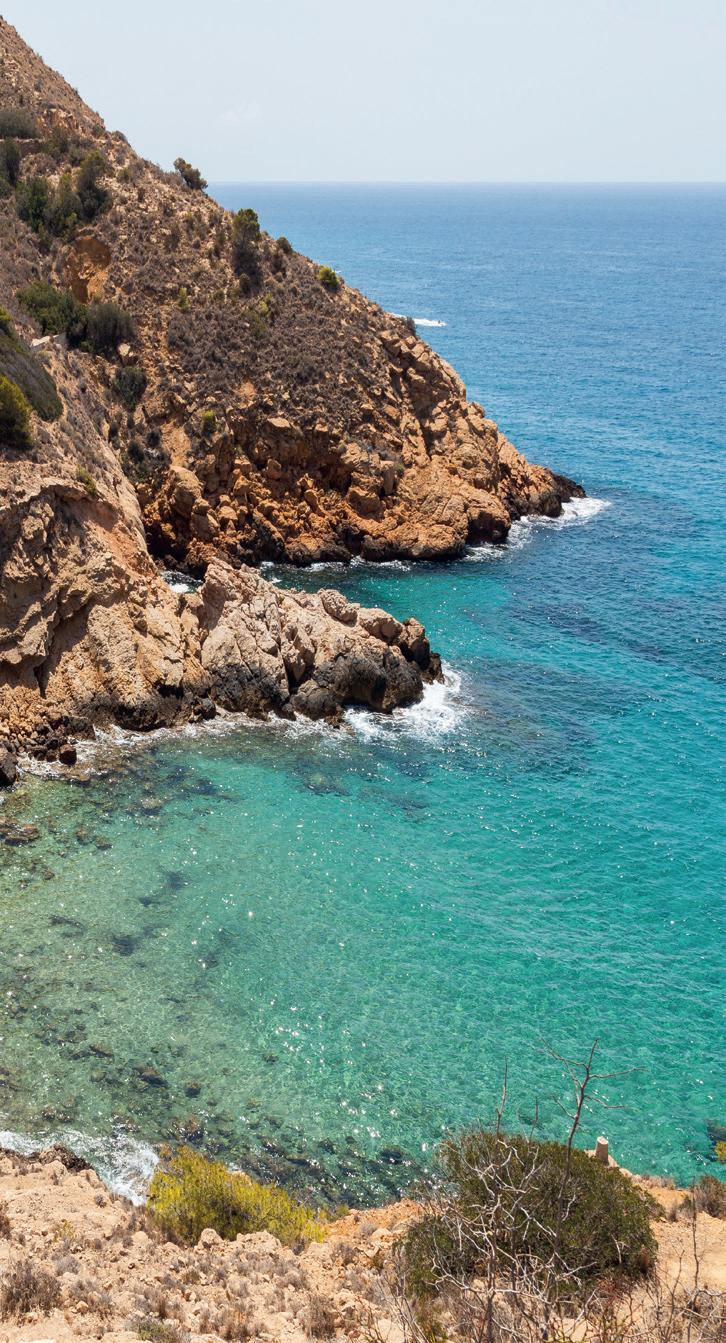
AT Lady Elizabeth School (LES), we aim to build a community of open-minded families and students who are constantly developing and learning, ready to thrive and contribute in today’s global world.
Our students are independent, curious, and active, exploring their own paths through a wide range of academic options, including 20+ GCSE and A Level choices.
We provide British and international private education for children aged 2 to 18, offering each student a unique and enriching learning experience.
Our philosophy, ‘Where confi dence grows’, is rooted in discovery and personal growth, helping every student develop the skills and mindset to succeed.
Our bus service from Benidorm to Gandia ensures easy access for families across the area.
We warmly invite families to experience LES fi rsthand, either by attending one of our open days or arranging a meeting with our admissions team to learn more about how we can support your child’s journey.


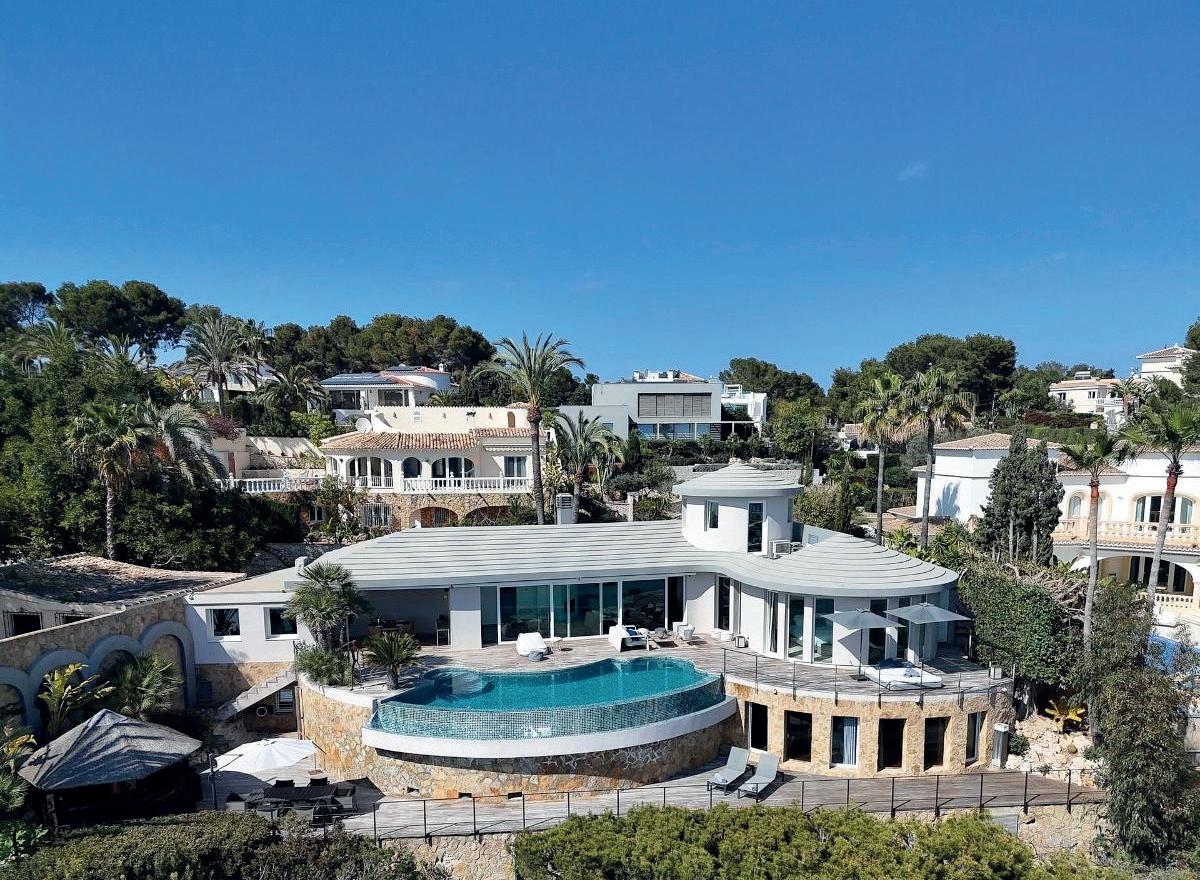
MAURICIO Umansky can be forgiven for checking his phone a lot. Before sitting down with the Olive Press in Moraira, the Los Angeles property mogul has been closing a ‘multi-million-dollar’ deal back across the pond.
A client wanted to buy a home in Aspen, offload two houses in Miami and California, and then purchase one in Texas.
All in a single phone call.
It is this high-octane lifestyle that turned Umansky into the global face of luxury real estate –and a Netflix star to boot.
Just as The Agency Costa Blanca North was opening its doors in January 2024, season two of Buying Beverly Hills was about to launch.
It’s enticing stuff: with one episode covering the sale of a $28 million mansion, another a peek around an NBA stars’ home.
Married for nearly three decades to actress and television personality Kyle Richards –known for The Real Housewives of Beverly Hills and as the aunt of Paris Hilton – Mauricio has built an empire grounded in family, authenticity, and ambition.
Three of his daughters – Farrah Brittany, Alexia Umansky, and Sophia Umansky – have followed in his footsteps, working within the business closing $12.4 billion in sales each year.
And this relentless drive to grow The Agency’s empire is what brought Umansky to the Costa Blanca on a sun-splashed autumn day.
Something about the Costa Blanca reminds him of Aspen – the world’s most expensive ski resort.
And that, he says, holds the secret to his next big venture.

By Joshua Parfitt

‘Bullish’ on the Costa Blanca
To understand Mauricio Umansky, you have to roll the clock back 24 years.
It was during the recession of 1991–92 that Umansky walked away from his father’s textile business to take a gamble on California’s high-stakes property market.
His first sale was a modest $700,000 home.
His second closed at $6 million.
Within a few years, he had become the top-selling real-estate agent in California – and the third in the United States.
Following a high-profile split from Hilton & Hyland, he co-founded The Agency in 2011.
You can see a theme here.
Just as the global economy began bouncing
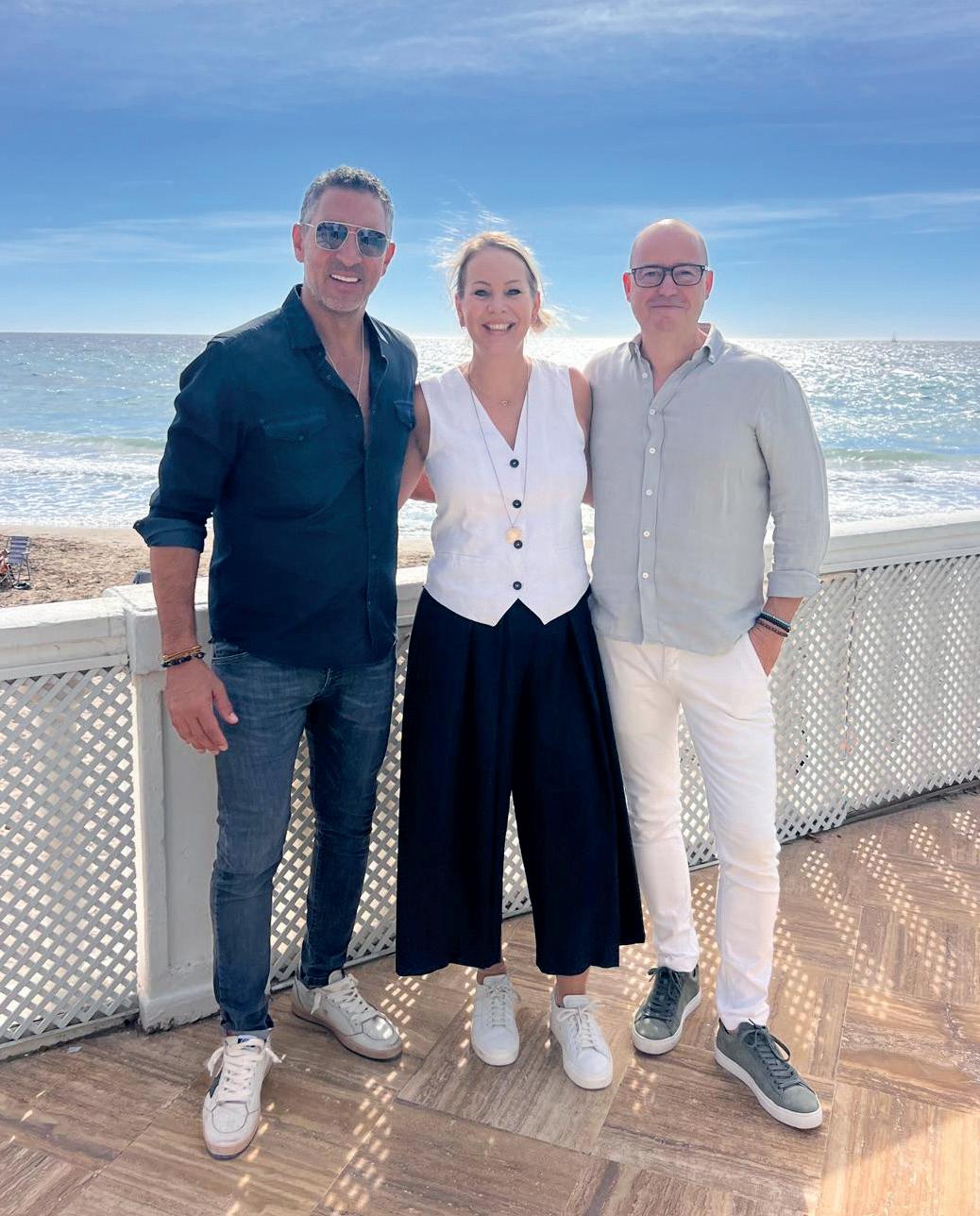
back from the COVID-19 downturn, Umansky was already plotting his next business expansion across the Atlantic.
The Agency’s Spanish footprint began in Port d’Andratx in Mallorca, then followed Marbella
In January 2024, the Costa Blanca North office in Moraira became the third European outpost.
“I think there’s great potential in Spain,” Umansky tells the Olive Press. The Agency now has six offices in Spain.
“The value for money is incredible compared to other luxury markets. I’ve just been at a villa today, right on the beach in the town, that you can purchase for just over five million.
“I haven’t seen many properties in the world with that much frontage on such a beautiful, beautiful ocean.”
With low interest rates and steady demand for luxury homes in enclaves like Moraira, Xàbia and Altea, he says he’s ‘bullish’ about the Costa Blanca.
Then comes the comparison that makes property insiders lean in.
“Aspen is its own little micro-climate,” he explains, referring to the Colorado ski haven that tops global charts for prime-real-estate values.
Even when the wider market slows, Aspen keeps moving, because the people who buy there always buy.
It’s a comparison he doesn’t make lightly.
The Costa Blanca, he believes, has that same enduring allure of limited space, international appeal, and a market that shrugs off trends.
Of course, The Agency isn’t the first luxury brokerage to spot opportunity along this coast, where Moraira regularly posts the highest land values in the Valencian Community.
Others have come before.
But Umansky insists his company holds a few secrets that give them an edge.
Innovations, he hints, that could soon change the way Europe’s most exclusive properties are bought and sold.
Keen-eyed readers will have seen the trump card Mauricio Umansky holds over competitors. If not, I’ll let Alistair Barton, Managing Partner at The Agency Costa Blanca North, spell it out.
“Most estate agencies hate it when somebody walks into the office and says, ‘We’re interested in Moraira, but we’re also looking at the Costa del Sol or even Portugal.
“For us at The Agency, that’s fantastic.”
Barton explains how the company’s global network has already allowed him to sell homes to clients based in Canada and then, from his desk in Moraira, assist with transactions in Mexico, Portugal the Netherlands, and Florida.
The result, he says, is a client-focused service that keeps people coming back.
Unlike traditional agencies that treat each sale as a one-off transaction, The Agency builds

‘long-term relationships’ that span continents –and years.
“Already, I have the phone ringing constantly with valuation requests,” Barton adds.
“And within the nearly two years we’ve been open, we’ve already had buyers come back and give us other properties to sell. I’d say we’ve reached about a 50–50 seller and buyer split in our client base.”
Across the table, Umansky glances up from his phone.
“I just checked last night,” he says, grinning.
“Globally, sellers make up 50.6% of The Agency’s client base.”
It’s a staggering statistic – especially at a time when the Bank of Spain estimates a national shortfall of around 400,000 to 450,000 homes, and estate agencies are scrambling for homes to sell.
But that strength is about to become something even more powerful.
At several points in the interview, Umansky and Barton refer to a new ‘tech system’ quietly being developed within The Agency.
Umansky predicts it will cause what he calls “a disruption” in how high-end property is bought and sold.
“We’re the leaders now.”
And with that, the man who’s conquered Beverly Hills hints how his next real estate revolution is about to unfold, right here on the Costa Blanca.
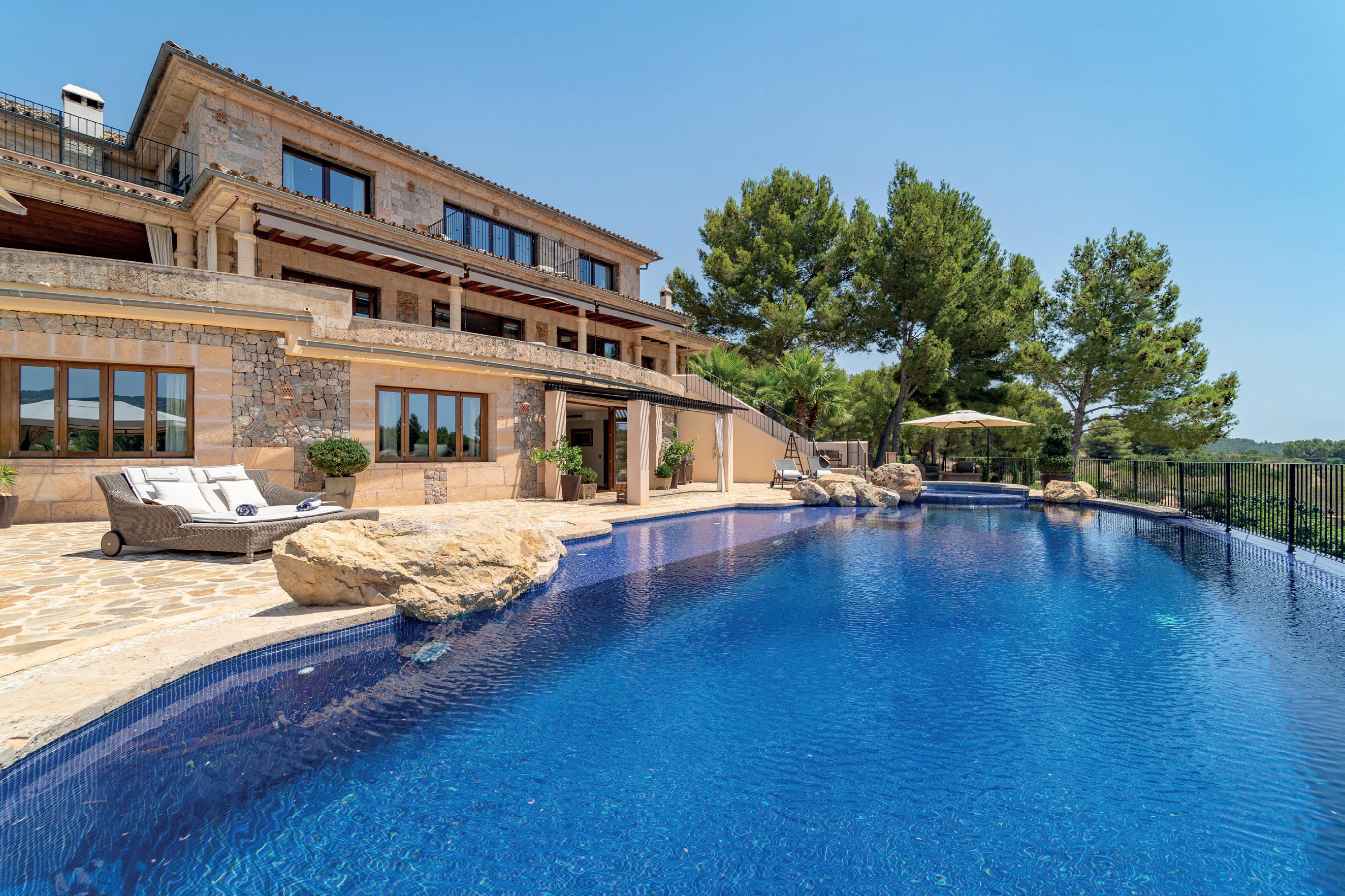

They operate through tight-knit, highly disciplined clans and dominate indoor marijuana cultivation around Granada, edging out traditional local clans with superior logistics and financing.
They also run sophisticated container smuggling operations through Valencia’s port.
They also work alongside Chinese gangs in cocaine and laundering operations, demonstrating remarkable versatility.
A major bust on the Costa del Sol last year saw 30 people arrested – including an Albanian kingpin – in an operation that intercepted 3.2 tonnes of cocaine smuggled from Ecuador.
Another Albanian boss Juxhin Drazhi (pictured left), one of Europe’s most wanted kingpins, was arrested while trying to flee his luxury villa in Almunecar, in July.
Their ascent is attributed to their aggressive pursuit of supply chain
control, high-level corruption, and their near-paramilitary approach to protecting their assets.
Serbian Traffickers:

Our Black Friday sale is back: Grab an annual subscription for 50% before the Christmas rush
IT might feel like the summer has only just departed, yet the festive season is just round the corner.
A whole month of chaos and family, scoffing and shopping, visiting and hosting – wouldn’t it be nice to treat yourself to a pre-festive gift to lighten the strain?
Luckily for you, dear reader, the Olive Press is once again firing up its famous Black Friday mega sale for an annual subscription to our digital version.
Now in its third year, this is not another gadget you don’t need, nor a bottle of plonk you’ll quickly forget.
This is a whole year’s worth of clarity; carefully curated and trusted reporting to help you make sense of life in Spain.
t) Julio Zambrana
Prosecutors singled out Malaga and Marbella, in particular, as the definitive main focus for international mafias, a phenomenon often dubbed ‘Narco-Marbella’.
Here, drug trafficking is seamlessly intertwined with complex financial operations.
The city’s luxury real estate sector, its dense web of foreign consultants, lawyers, and estate agents, and the ease of setting up shell companies make it a perfect place to clean cash.
Mafias don’t just buy luxury villas to live in; they use them, often buying and selling properties multiple times in short succession, to wash millions in narco profits.
The report revealed that employees of a private scanning firm at Malaga Port came under investigation for helping smugglers slip containers through undetected.
Because let’s be honest – the next month is going to be full of noise.
From now til November 28, you can get a full 12-month subscription for 50% off.
Slashed from €50 a year – half price for the stories that matter and journalism you can rely on. For expats, homeowners living abroad and travellers who keep coming back, this is the best place to come for important and reliable information rather than rumour.

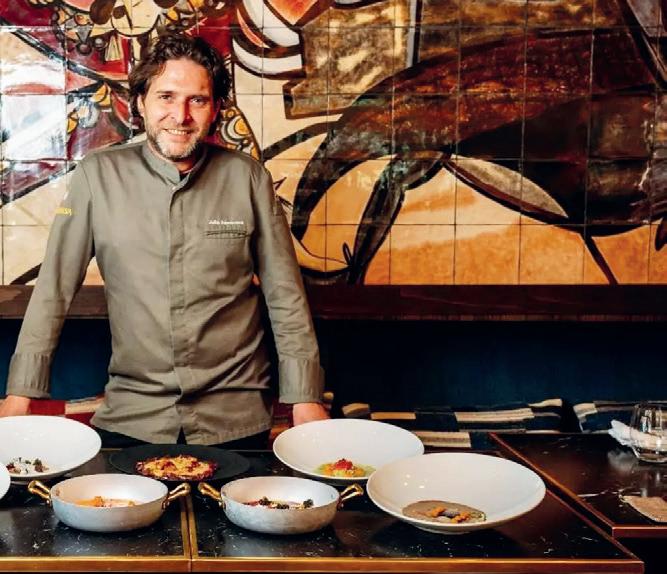





The Balkan Cartel’s European Hub Serbian groups are key components of the highly organised Balkan Cartel, considered by many global law enforcement agencies to be the most sophisticated cocaine trafficking machine operating today. They use Spain as their European base, working closely with Spanish gangsters. They specialise in importing high-quality cocaine from South America and financing these operations through extensive marijuana cultivation networks across Catalunya and Andalucia.
hubs, fresh talent is emerging, fusing local tradition with inventive techniques to attract Michelin’s attention.
A new generation of one-star hopefuls is pushing boundaries and redefining regional cuisine. Alex Vidal’s Origen in Carcaixent (Valencia) transforms Mediterranean staples with precision and creativity. We keep hearing good things about this place and are desperate to visit.
Mari Carmen Velez’s La Sirena in Petrer, Alicante, has already drawn Michelin recognition as a recommended venue, signalling a promising path toward its first star.
You can read Olive Press reviews of Kaleja, Bardal, Deessa, Aponiente, Sollo, Sarmiento and many more of Spain’s celebrated restaurants online at www.theolivepress.es

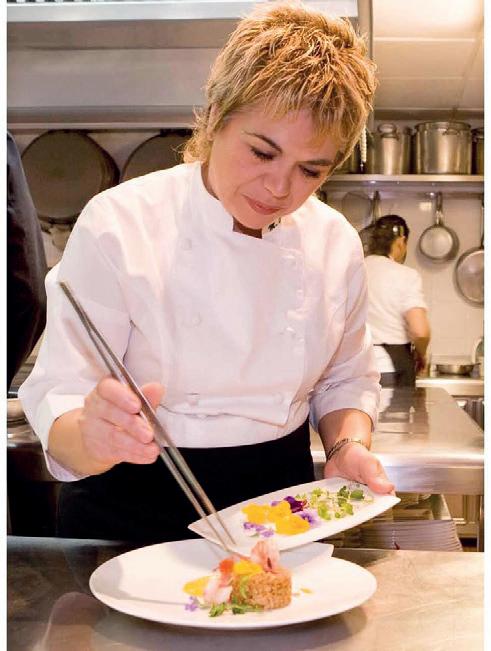
The sheer scale of the undeclared wealth flowing through the region has created an atmosphere of impunity.
The most alarming finding in the report is that violence is escalating dramatically.
The traditional unwritten rules of organised crime are being ignored, and public displays of force are becoming commonplace.
In Huelva and Cadiz, the highly militarised drug launches, known as ‘narcolanchas’, are now routinely escorted by hooded men wielding Kalashnikovs and military-grade weaponry. Shootings against police have already been recorded, while in Jerez, automatic weapons are turning up in almost every major bust. Prosecutors say some gangs even flaunt assault rifles on social media, turning drug shipment unloadings into paramilitary spectacles designed to intimidate rivals and law enforcement alike.
Their mastery of communication tech is legendary; with one Serbian boss jailed in 2024 after prosecutors revealed he had coordinated massive shipments using the encrypted SKY-ECC network, proving their top-tier logistical capability.
Another Serbian drug trafficker on the run since 2016 was arrested in Lloret de Mar, near Barcelona, this year after a fake Slovakian passport exposed his identity during a routine police check.
Their power stems from precision, global connections, and compartmentalization.
Chinese Networks: The Financial Leviathans
Chinese groups are not just focused on drug trafficking; they are integral to the money laundering machinery that sustains every other major organization.
They team up with many gangs for smuggling, while also running large counterfeiting schemes and massive financial fraud operations.
One of their primary methods is the widespread use of falso autonomo (fake self-em-
While the FGE report is comprehensive, it omits many traditionally feared names.
The Turkish mafia, despite being responsible for a string of shootings on the coast recently do not feature prominently, while the once-mighty Swedish mafia appears to have been largely dismantled, in part due to the ongoing trial in Madrid.
Even the Russian mafia, who historically controlled huge financial networks, get no specific mention in the report, though their financial presence in the real estate market is still heavily felt.
The footprint of British and Irish gangs still emerge as key figures on the mafia coastline though.
According to the report, the UK filed 30 extradition requests to Spain in 2024 – the third-highest of any country after only Peru and Russia - indicating Spain is a preferred bolt-hole for British criminals. Ireland, meanwhile, lodged a staggering 45 requests for Spain’s prosecutors to gather evidence or carry out procedural steps in Irish criminal cases.
ployed) schemes and fraudulent VAT operations to create legitimate-looking income streams that wash narco profits. They rely on tightly closed, highly disciplined networks that make infiltration incredibly difficult for police.
It allows them to move enormous sums of illegal money out of Spain and into global markets, ensuring that the wealth generated from cocaine and cannabis can be spent legally.
Dutch and Lithuanian Gangs: The Amphetamine Highway While the Mocro Maffia dominates the cocaine trade, other Dutch and Lithuanian groups have moved in on the burgeoning synthetic drug market.
In Granada, these networks are intensely focused on the cannabis trade, replacing traditional family growers and defending their highly valuable, high-yield indoor plantations with fi rearms and sophisticated security setups.
No one-man band relying on AI to publish dozens of stories, our team of NCTJ-trained journalists dotted around the country will keep you informed for the price of one coffee a week! Join us and you will get no less than TWELVE special newsletters a week on everything from the most important property stories to the most interesting travel tips.
And then there are Green and Health mailouts and a Saturday special from our Digital editor Walter Finch, plus a daily news update every day.
Want to know what’s happening across Spain, or just in your local area? We’ve got it covered. So why not sign up now, expand your horizons, and plug in to what’s really going on in Spain.
Just use the QR code below to take up this offer.
The offer is only available to anyone who has not subscribed before.

Congratulations to our readers who won our competition for tickets to see 70s British rock band the Psychedelic Furs in Malaga this week. An incredible 50 of you applied, with sadly, just three pairs of tickets.
Marcus Miller, of Heat Pump Suppliers, Malagueña Carmen Sanjuan and Malaga car dealer Alejandro Sanchez grabbed them – we hope you all had a wonderful time.




STEELMAKING giant ArcelorMittal has taken a significant step toward sustainable production by installing a green hydrogen combustion system at its Olaberria plant in Spain (pictured).
The new system replaces traditional natural-gas-fired reheating furnaces with units that use 100% green hydrogen oxyfuel, reducing the plant’s carbon footprint.
The project, developed in collaboration with Spanish company Sarralle and Nippon Gases, aims to decarbonize the energy-intensive process of heating steel blooms and billets for shaping.
While hydrogen is seen as a promising solution for low-carbon steelmaking, particularly for producing green virgin iron through direct reduced iron (DRI) processes, ArcelorMittal’s move in Olaberria contrasts with the company’s recent decision to turn down €1.3bn in subsidies for a hydrogen DRI conversion at its German plants.
The company cited high energy costs in Germany as a barrier.
Olaberria, which has a capacity of 0.95 million tons per year, primarily produces steel from scrap metal in an electric arc furnace.
The green hydrogen combustion technology marks a key milestone in the steel industry's path to decarbonization.
SPAIN’S Prime Minister Pedro Sanchez has announced plans to tax private jets as part of his government’s efforts to tackle climate change.
Speaking at the COP30 climate conference in Belem, Brazil, Sanchez revealed that Spain is working with other nations, including France, Kenya, and Barbados, to implement taxes on premium-class flights and private jets. He argued: “It is only fair that those who
have more – and pollute more – pay their fair share.”
The move has been welcomed by environmental activists, with Greenpeace calling it ‘an important step’ towards holding the sector accountable. A detailed plan on how the levies will be implemented is expected soon, with it expected that proceeds will be
partly allocated to help climate-vulnerable nations.
Sanchez also highlighted the human and economic cost of climate change, which has claimed over 20,000 lives in Spain in the past five years and caused €44 billion in losses across the EU.
Speaking alongside Brazilian President Luiz Inacio Lula da Silva, Sanchez assured delegates that Spain remains a reliable ally in the fight against climate change.
A FOURTH flock of Spanish Griffon Vultures has taken to the skies over Cyprus as part of an ambitious conservation effort to save the island’s dwindling vulture population.
After nine months in a specially designed aviary in Limassol, the final two vultures were released in mid-October, ready to join the existing population.
Hailing from Andalucia, where their numbers remain stable, the vultures were fitted with GPS trackers before being sent to Cyprus.
The Griffon Vulture, Cyprus’s largest bird of prey, has faced catastrophic threats in recent years, including poisoning and electrocution, causing the population to plummet to a mere 8-10 birds on the island by the early 2010s. However, thanks to conservation initiatives like the

By Dilip Kuner
GYPAS and LIFE with Vultures funds, spearheaded by BirdLife Cyprus, the population is slowly recovering. But experts warn Cyprus still needs around 200 vultures for a sustainable future.
The Griffon Vultures, now soaring freely, will bolster the island’s current population of just 41.
Spain, a conservation powerhouse, has played a key role in these reintroductions. The Spanish Griffon Vultures are just the latest in a string of successful projects.
In the 1990s, after the Red

Kite population in England had collapsed due to hunting and habitat loss, Spain played a crucial role by providing healthy, wild Red Kites from its own stable populations in regions like Castilla y Leon. These birds were reintro-
duced into England, where they have since thrived, with populations continuing to grow. Ironically, the English population is now being used to repopulate the Extremaduran Red Kite population after it collapsed.








SPAIN is marking 50 years since the death of notorious dictator Francisco Franco, but instead of healing, the country’s still grappling with deep cultural and political divisions over his brutal legacy.
Franco died in his bed on November 20, 1975, aged 82, after a 36-year reign of terror. His regime, which followed the bloody Spanish Civil War, was marked by imprisonment, torture, and exile for anyone who dared to oppose him.
The dictator seized power with the help of Nazi Germany and Fascist Italy, wiping out Spain’s fledgling democracy.






By Dilip Kuner








Half a century after Franco’s death, Spain is divided over how to remember the man who shaped the nation with fear, repression and violence




Since his death, Spain’s path to democracy has been anything but smooth. A 1977 amnesty was supposed to help heal the wounds, but critics say it swept the country’s dark past under the rug. Now, 50 years later, the dust is still there - and it's still stirring up a storm.
A recent poll shows most Spaniards condemn the dic-
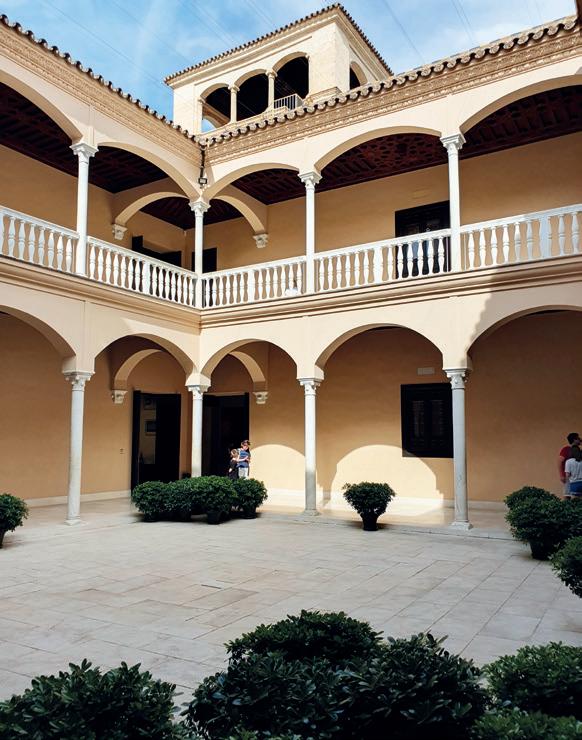



tatorship, but a surprising number - especially young people - still think it wasn’t all bad.

Experts blame so-

cial media and poor education for the rise of a ‘revisionist’ narrative about Franco.
“It’s an education problem,” says political scientist Paloma Roman. “Younger generations
A FAMOUS Picasso painting, Estudio con cabeza de yeso, has been loaned from New York’s Museum of Modern Art (MoMA) to Malaga’s Picasso Museum for its latest exhibition, Picasso: Memoria y Desea.
The 1925 painting, one of Picasso's most celebrated works, explores the tension between his cubist style and his pursuit of classicism. The artwork features a bearded bust alongside a sculpture’s remains, a book, and other objects.
According to exhibition curator Eugenio Carmona, the painting reflects Picasso’s transformation during this period, where the boundaries between modernity and classicism blurred. Carmona pairs Picasso’s work with that of 111 other 20th-century artists to explore themes of memory, desire, and political tension.
The exhibition, which opened last week, runs until April 12, 2026, at the Museo Picasso Malaga.



PALS: Franco greeted Hitler in Spain, but refused to join the war
don’t know the full story and can easily be sucked into a false narrative.”
The political battle over Franco's memory is heating up, with the left-wing government

under Prime Minister Pedro Sanchez pushing to honour the dictator’s victims. They’ve exhumed his remains and started removing Francoist symbols from public spaces. But the conservative opposition isn’t having it, accusing Sánchez of ‘reopening old wounds’ to distract from his own scandals.






Meanwhile, far-right groups are holding memorials for Franco, stirring up even more tension. On the other side, anti-fascist protests are set to follow. It's clear - Spain’s bitter cultural clash over Franco’s legacy is far from over.



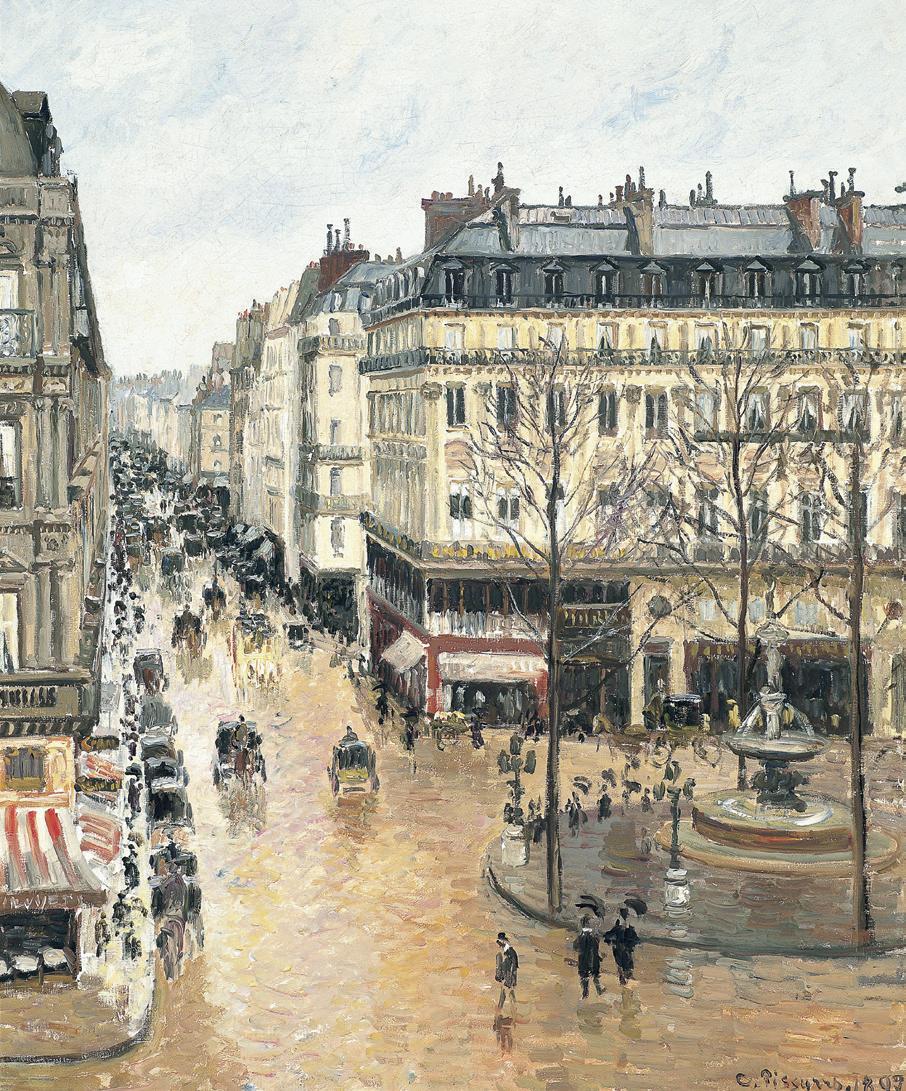
CALIFORNIA is once again fighting in US federal court to return a valuable Camille Pissarro painting, looted by the Nazis, to the Cassirer family.
The painting, Rue Saint-Honoré in the Afternoon. Effect of Rain (above), was seized from Lilly Cassirer in 1939, and after WWII, the family received compensation, though far below its current value.
The artwork ended up in the collection of Spain's Thyssen-Bornemisza Museum in Madrid, where it remains today.
California's Attorney General, Rob Bonta, has intervened to defend a state law requiring the return of stolen art, a law passed to support families like the Cassirers. The law, which was contested by the museum, faced legal challenges, but Bonta argues it upholds fairness and moral responsibility.
The case, ongoing for two decades, is being closely watched for its potential to set a new precedent in international looted art disputes.
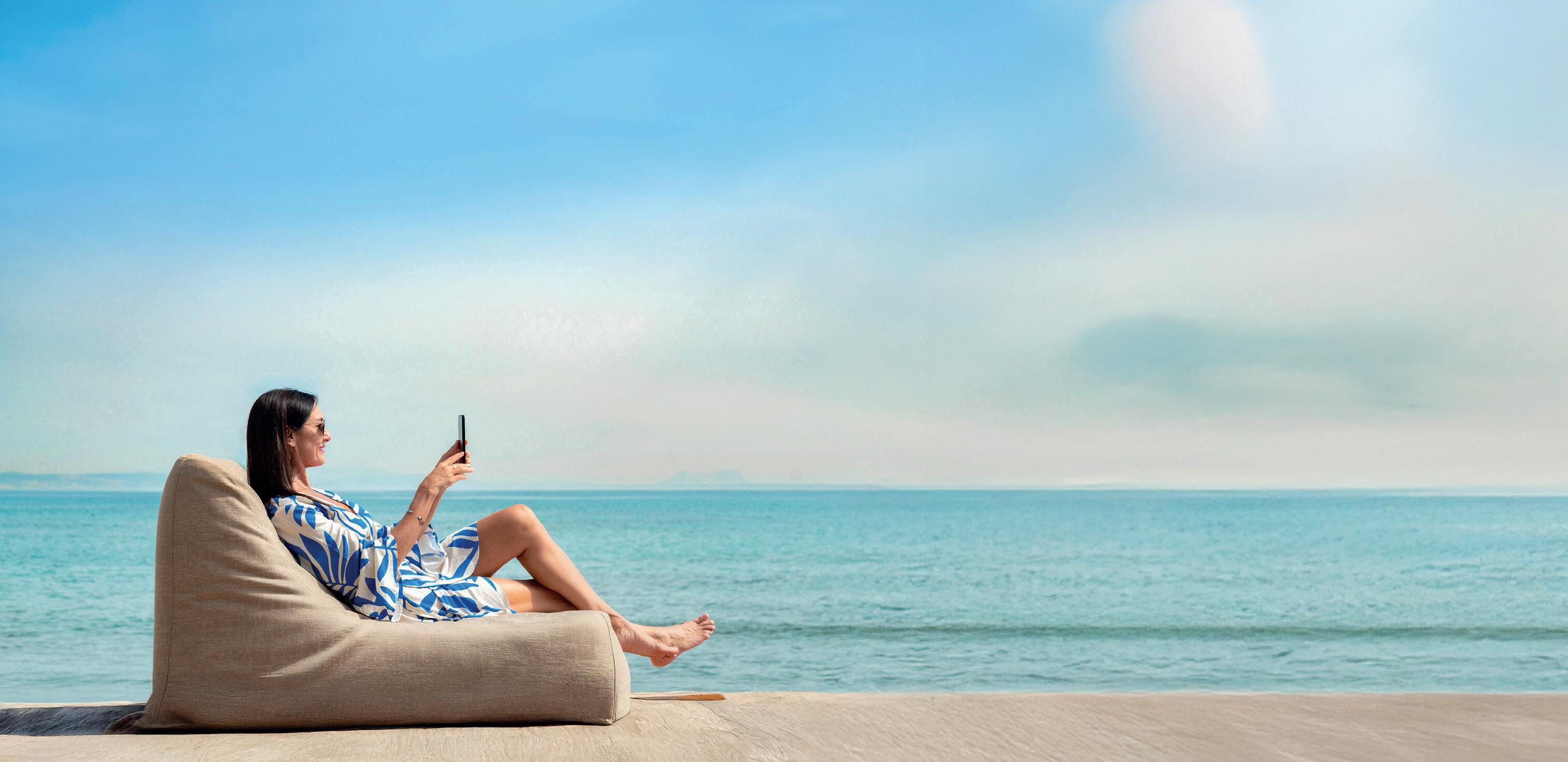




TRAIN passengers travelling on high-speed services run by Spain’s state-owned railway operator will now be able to claim compensation if their journey is delayed by just 15 minutes.
From the start of next year, passengers on Renfe services will be eligible for a 50% refund of their ticket price if the train arrives 15 minutes or more late, increasing to a full refund if the delay is over half an hour.
The move comes after an amendment to the Sustainable Mobility Law proposed by the conservative Partido Popular (PP) was backed in parliament by an unlikely coalition of Vox, Podemos, Junts per Catalunya, Esquerra Republicana (ERC) and the Galician nationalist bloc (BNG).
The amendment reverses changes made in July 2024, which meant Renfe only had to dish out a 50% refund if services were more than an hour late.


SPAIN has secured a major victory in a London court, blocking efforts by US vulture funds to seize state assets linked to €1.7 billion in renewable energy compensation claims. The Commercial Court ruled that arbitration awards issued under the Energy Charter Treaty cannot be
transferred to third-party investors, denying a tactic used by US funds to pursue large payouts. The case involved OperaFund Eco-Invest and Schwab Holdings, which
sued Spain after the government reduced renewable energy subsidies over a decade ago. These awards were later purchased by Blasket Renewables, a US-linked
distressed-debt fund that sought to enforce them in the UK.
The court sided with Spain, ruling that the original claimants, not third-party funds, hold the rights to the awards.
The decision limits the ability of ‘vulture funds’ to pursue aggressive asset seizures, though an appeal may still be filed.
SPAIN’S annual Christmas lottery could get even fatter after ticket sellers for El Gordo (the fat one) called on the government to increase the draw’s top prize in line with inflation. Every December, millions of Spaniards hold their breath and watch on in hope of striking it rich as children from a Madrid school sing out winning five-digit numbers drawn from a lottery machine - each of which are divided into 172
Ticket sellers for Christmas lottery urge government to up prize in line with inflation
By Ben Pawlowski
series, which themselves consist of 10 decimos.
The festive tradition began in 1812 as a way of funding Spanish troops fighting Napoleon’s army - but Spain’s lottery shops
Across:
say it is time to change. They want the price of a decimo ticket - currently €20 each - to rise by

SPAIN’S central bank has sounded the alarm over the economy, urging the government to lower public spending and cut debt levels to protect the country from the impact of geopolitical instability such as President Trump’s tariff war.
6 Wax paper, 8 Ones, 9 In town, 10 Finals, 11 Armed robbery, 14 Habeas Corpus, 17 Mayors, 20 Thirst, 21 Pisa, 22 Marigold.
Down:
1 Far north, 2 Opener, 3 Prefab, 4 Goon, 5 Nell, 7 Proverb, 12 Earring, 13 Yourself, 15 Assume, 16 Caters, 18 At it, 19 Oral.


€5, with the top prize upped from €400,000 to €500,000.
“The jackpot hasn’t changed in 14 years, while prices have climbed about 26%,” complained Borja Muniz, president of ANAPAL, a group representing Spain’s 4,100 lottery shops.
“Before, you could buy two apartments with it. Now it barely covers one,” he told Reuters.
ANAPAL have sent their proposal to the state-run lottery agency and budget ministry, which will have the final say on whether the ‘Fat One’ will be-
come plumper. They also want their commission on El Gordo sales to increase from 4.5% to 6%, in line with other national lottery draws.
Lottery ticket sellers warn that inflation and the rising costof-living have eaten into their profits.
Currently, the top El Gordo prize sits at €400,000. The second prize is €125,000 and the third is €50,000. There are also two fourth place prizes of €20,000, followed by eight fifth prizes of €6,000.
“It is necessary to adopt concrete measures for expenditure control and/or revenue enhancement,” the Bank of Spain said in a recent financial stability report. It said debt remains ‘high, both from a historical perspective and in the European context’ and must be slashed to protect the Spanish economy from ‘potential sudden shifts in market financing conditions’.
Currently, Spain’s public debt sits at 103% of GDP - although the debt ratio is predicted to fall below 100 percent by 2027. Public debt peaked during the pandemic at a high of 124.2% of GDP as the government borrowed heavily to support healthcare and protect jobs. But the Bank of Spain warns that more challenges are on the horizon.
HAVE you thought about hiring a financial advisor, but not done so? You are not alone. Many of us put off the decision.

Peter Dougherty

Here are some of our reasons:
We think we’re not wealthy enough
It is true that many financial planners have portfolio minimums. But some firms (where I work being one of them) accept new clients regardless of how much they invest.
At BISSAN Wealth Management, we do so because good financial planning is much more than just investing.

in Spain

We don’t think we have enough time
We might believe we don’t have sufficient time to deal with a financial planner. Ironically, a good financial planner will save us time in the long run. An electrician will likely fix our lights in less time and do it more effectively, the same is true for a good financial planner.
We might have to spend time talking to a planner initially as they try to get to know our financial goals and circumstances, but there’s little time commitment necessary once they’re up and running.

• Certified Financial Planner® in U.S.
• Author of two financial planning books
We think we can do it ourselves
You probably can do it yourself. But be honest, will you devote the time and energy to analyze and then decide on important financial choices, and later monitor your results and make periodic adjustments?

Are you ready to be both the mechanic and the driver of your investment vehicles, and the person who talks yourself out of buying crypto at midnight?
There are a variety of reasons for hiring an advisor. Some people like to manage their own plan but hire a financial planner to serve as an objective third party to gauge whether they are on track.
Others find they do not enjoy the planning process and have little patience for it -- they happily turn over the responsibility to a qualified advisor.
We don’t think we can afford an advisor
Many of us will make an investment if we expect the future benefits will

be greater than the initial expenditure. The same should be true of hiring a financial planner.
Studies have shown that those of us who hire a financial planner achieve better financial outcomes and enjoy greater personal well-being than those who don’t. Many of these benefits result not from picking outperforming investments, but from helping clients choose a suitable asset mix, avoid behavioral mistakes, improve tax efficiency, and achieve comprehensive planning goals.
We view financial advisors as ‘salespeople’
Let’s face it, many financial advisors are salespeople. But many are not -- instead, they are interested in our
goals, ambitions and values.
If you are looking to hire an advisor, be willing to ask lots of questions. Has the advisor obtained credentials such as the European Financial Planner certificate in Spain or the Certified Financial Planner® certification in the US? Is their firm authorized and supervised by the CNMV (Comisión Nacional del Mercado de Valores), the financial regulatory authority in Spain? What is the process of working with the advisor? Look for someone who has an established process to help you evaluate your needs, anticipate changes and help you adjust course as needed.
We face too many
Some of us avoid hiring a financial planner simply because we feel overwhelmed by having so many choices.
If so, here are a few practical steps we can take:
1. Pick two or three financial planners to interview.
2. Set up a free video-call consultation with each to learn more about their methodology, how they charge, etc.
3. Choose a planner whose services align with your circumstances and with whom you feel comfortable personally.
In conclusion, we can absolutely go it alone financially without the help of a financial advisor. Just like we can cut our own hair. It might work, but the results are usually better when we let a professional handle the sharp objects.

LOVE a nightly copa or crack open a bottle of vino to unwind? A major US study says you could be steering yourself towards a stroke that hits earlier – and far harder.
Researchers at Mass General Brigham, a Harvard-affiliated health system, found that people knocking back three or more drinks a day suffered intracerebral haemorrhages 11 years earlier than moderate drinkers. Their brain bleeds were also around 70% larger and far tougher for doctors to control.
The team analysed more than 1,600 patients treated
Heavy drinkers suffer strokes ‘earlier, deeper and more severely’
By Ben Pawlowski
for brain bleeds at Massachusetts General Hospital between 2003 and 2019, studying scans and recorded alcohol habits. Heavy drinkers were typically 64 years old at the time of their stroke – more than a decade younger than lighter

drinkers – and were twice as likely to suffer deep brain bleeds or ones that spread
into fluid-filled spaces around the brain.
SPANISH experts are warning long-term users of melatonin about possible heart-failure risks.
Melatonin is a neurohormone produced by the pineal gland to regulate sleep, and its synthetic version is widely sold in Spain, where its use is unregulated.
A new American Heart Association study analysed five years of clinical records from more than 130,000 adults with insomnia, comparing 65,414 melatonin users with non-users.
Those taking melatonin for at least a year were 90% more likely to suffer cardiac arrest, 3.5 times more likely to be hospitalised with heart failure, and twice as likely to die from heart-related causes.
Lead author Ekenedilichukwu Nnadi noted the study’s limitations, including lack of peer review, but said the correlations are concerning. Spanish specialists say the findings should serve as a wake-up call.
Doctors also noted higher blood pressure, lower platelet counts and more signs of tiny-vessel damage linked to dementia and memory decline.
“We now know heavy drinking leads to larger, earlier brain bleeds,” warned study co-author Edip Gurol of Harvard Medical School, urging people to
minimise alcohol use.
But there’s a twist for younger boozers. A long-running Norwegian study suggests heavy drinking in late teens and early adulthood may actually boost career prospects.
Social
Sociologist Willy Pedersen tracked over 3,000 young Norwegians for almost two decades and found that those who drank heavily in social settings later achieved higher education and income levels.
Alcohol isn’t magic, he stresses – it’s a ‘marker of sociality’ that helps some young adults build networks that pay off later.

ISTILL remember a colleague who, after a long career as a medical director, decided to spend his final years before retirement returning to what he loved most: caring for patients.
He told me, with amazement, how much society had changed since the last time he sat beside an examination table.
Back then, he said, anyone over 60 was considered old…and he was often correct: they smoked, led sedentary lives, did little to no exercise, and were often overweight.
Today, that reality is very different. People reach 60 feeling young, energetic, eager to take care of themselves and enjoy life.
Many walk regularly, practice yoga, ride bicycles, watch their diet, and even have their own physiotherapist or personal trainer.
This shift in mindset has completely transformed the way we age.
Taking care of oneself is no longer a trend, it’s a way of life. Thanks to that, people are not only living longer, but reaching ‘old age’ in better health
Writing exclusively for the Olive Press, Spain’s national football team doctor Claudio Vazquez (below), reveals how putting on 5kg in weight means adding 20kg of extra pressure to every step
and with a far higher quality of life.

But while these new lifestyle habits are bringing greater longevity, joint degeneration remains a reality. It’s a fact of life.
Although we can delay or lessen its effects, sooner or later we all experience, to some degree, the natural wear and tear of our joints.
Studies are clear: around 80% of chronic pain cases are due to degenerative joint disease. And the inevitable question arises, how can we fight it?
step.
In other words, gaining 5 kg means adding about 20 kg of extra pressure to every stride. Achieving and maintaining an ideal weight is therefore one of the best investments in joint health. But nowadays, walking or cycling alone is not enough.



We now know that strength training (at least twice a week) is essential to maintain muscle tone and prevent sarcopenia, the progressive loss of muscle mass and strength.
I’m afraid there’s no single or miraculous solution. The key lies in a multidisciplinary approach. Body weight though is the one definitive silent enemy of our joints. According to various studies, every extra kilogram adds between three and six times more load to the knee with each
more advice and consultations

Strong muscles act as a natural ‘shock absorber’ that protect the joints from wear.
Nutritional supplements have also become a strong ally in joint care. Vitamins D and C, along with minerals and hydrolyzed collagen, can help preserve joint structure and function, especially when combined with exercise and a balanced diet.
When joint pain and degeneration persist, regenerative medicine offers safe and effective alternatives. Minimally invasive techniques such as hyaluronic acid or platelet-rich


plasma (PRP) injections are being used with excellent results, helping many active patients avoid surgery. It’s also important to choose the right type of exercise. Weight-bearing joints (the hips, knees, and ankles) suffer more with high-impact activities such as running or long-distance walking. This doesn’t mean giving up exercise, but rather choosing wisely.
I strongly advise gym workouts, cycling, elliptical training, and swimming, which are all safe and effective ways to stay fit without damaging the joints.
As I often tell my patients: it’s not about moving less, it’s about learning to move better. The good news is that when surgery is needed, outcomes are excellent. Knee and hip replacements now achieve success rates above 90%, allowing patients to regain mobility and return to their daily activities. In short, there are no excuses for neglecting your health. By maintaining a healthy weight, building muscle strength, choosing the right exercise, and seeking timely treatments, we can continue to enjoy movement and life to the fullest.


BRITISH motorists could face a new ‘payper-mile’ tax in Spain under UK Chancellor Rachel Reeves’ autumn budget plan. The levy, set to start in 2028, would apply even on foreign roads, sparking criticism.
A MAN, 77, was caught selling cocaine out of his car by Valencia police who seized €85,000 in cash as well as drugs in small plastic bags.
A TEAM of Palestinian footballers which played a charity match in Bilbao’s San Mames Stadium in aid of Medecins sans frontieres, attracted a crowd of 50,000.





AFTER a few hours on the Rock it was only natural he would look for somewhere appropriate to graze.
Previously heading out into the wilds of Spain to go hunting, this time Donald Trump Jr, 48, luxuriated at the rather more serene surroundings of Marbella’s five-star Puente Romano hotel.
By Walter Finch
The President’s eldest son had his new girlfriend, influencer Bettina Anderson, 38, in tow after all (pictured together).
The pair spent the weekend at the luxury resort, mostly in their suite, only being seen once, eating at the hotel’s beachside Sea
LUIS Rubiales, the disgraced former head of the Spanish Football Federation (RFEF), was pelted with eggs by his own uncle during a book launch in Madrid.
The relative, also named Luis Rubiales, launched three eggs at the stage while shouting: “Don’t worry, nothing’s up!”
Two eggs hit Rubiales, and the assailant was arrested by police. Rubiales, who resigned after a controversial kiss with Jenni Hermoso, was fined €10,800 for sexual assault. He is currently serving a three-year football ban and faces a corruption probe over the Spanish Super Cup’s relocation to Saudi Arabia.
Grill restaurant. Sensibly they didn’t venture out into the nearby resort, or up the hill to the famous mountain town of Ronda.
But what was very apparent was the amount of security in town for their visit.
There were said to be dozens of private security guards, as well as a close team of bodyguards and even uniformed Spanish officers in situ.
He had arrived at Malaga airport on Friday and been taken on a four-car motorcade all the way to Gibraltar, where former UK Foreign Secretary Jeremy Hunt was visiting this weekend. He spent nearly four hours in a meeting at the Rock’s leading law firm Hassans.
Trump Jr is the vice-president of the Trump Organization and has been an enthusiastic promoter of the family’s controversial crypto schemes which have made them hundreds of


millions of dollars.
He was filmed heading into the meeting with senior partner James Levy and Chief Minister Fabian Picardo. Also present were businessman Christian Ryan and Russian Konstantin Sokolov, both of whom are involved with a proposed €2 billion data-centre, which would be the largest private investment for Gibraltar.
Picardo later said the meeting involved ‘investors and people interested in understanding what Gibraltar can do’.
Socialite and model Anderson has become a regular fixture at Trump Jr’s side since rumours were confirmed just last year – while he was still engaged to former Fox TV host Kimberly Guilfoyle.
AN African wild cat illegally kept as a domestic pet has been rescued from an Alicante home.
The five-year-old female serval called Tila became too much of a handful for the family. Fortunately a rescue centre in Villena, AAP Primadomus, was able to step in and help.
“The reality is that as they grow, servals become very difficult to keep at home, especially with small children or if you have visitors as the animal gets nervous,” explained the family in a statement.
COAST guards have rescued a man who was plucked from the sea 37 kilometres off the coast - floating precariously on an inflatable mattress. The astonishing rescue took place after a freighter spotted the lone figure bobbing like a discarded toy in the deep blue. The man, instantly dubbed ‘Mad Mattress Man’ by local rescue teams, had apparently paddled out from Estepona’s beaches, equipped only with the kind of cheap plastic lilo you’d find at a beachfront kiosk before being swept away by the current.
